 15/09/2012 12:03 15/09/2012 12:03 |
|
| | | OFFLINE | | Post: 25.496
Post: 7.991 | Registrato il: 28/08/2005
Registrato il: 20/01/2009 | Administratore | Utente Master | |
|
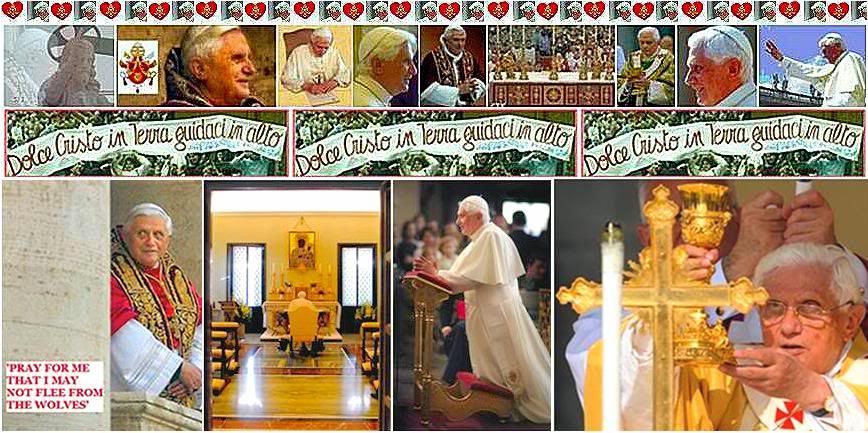
 Day 1
Day 1
Signing of the Apostolic Exhortation
'Ecclesia in Medio Oriente'
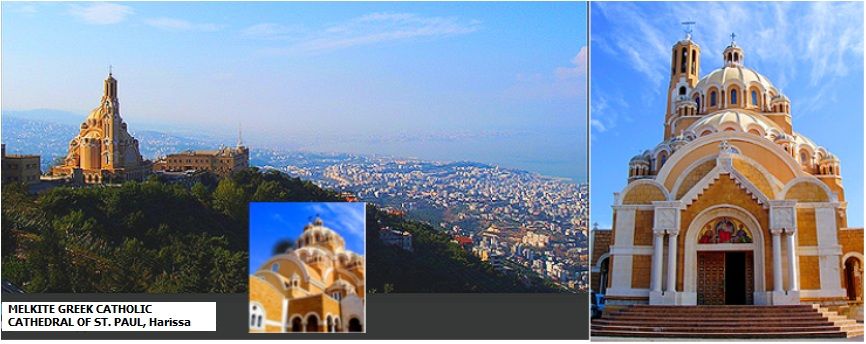
 Benedict XVI's exhortation:
Benedict XVI's exhortation:
'Churches of the Middle East, fear not!'
By Van Meguerditchian and Wassim Mroueh


HARISSA, Lebanon, Sept. 14 - Pope Benedict XVI signed the Post-Synodal Apostolic Exhortation of the Special Assembly for the Middle East of the Synod of Bishops Friday, urging Christians in the region to be brave and remain loyal to their beliefs and values.
“Churches of the Middle East, fear not, for the Lord is truly with you, to the close of the age.
“Fear not, because the universal Church walks at your side and is humanly and spiritually close to you,” the Pope said in his homily during a liturgy at Harissa’s Saint Paul Basilica.
“In light of today’s Feast, and in view of a fruitful application of the Exhortation, I urge all of you to fear not, to stand firm in truth and in purity of faith,” Benedict said.
“This is the language of the cross, exalted and glorious!”
The Pope then signed the Exhortation, which includes recommendations made to the Christians of the region during the Special Assembly for the Middle East of the Synod of Bishops, which convened in the Vatican in October 2010.
“By its biblical and pastoral orientation ... and its summons to dialogue, the Exhortation points out a path for rediscovering what is essential: Being a follower of Christ even in difficult and sometimes painful situations, which may lead to the temptation to ignore or to forget the exaltation of the cross,” the Pope said.
The Pontiff said that the Exhortation encourages “genuine” dialogue among different religions based on the faith in one God.
“The Exhortation shows openness to authentic inter-religious dialogue based on faith in the one God, the Creator. It also seeks to contribute to an ecumenism full of human, spiritual and charitable fervor, in evangelical truth and love,” he said.
Pope Benedict – who arrived for a three-day visit to Lebanon Friday – said that the synod discussed all aspects of the situation of Christians in the Middle East.
“In examining the present situation of the Church in the Middle East, the synod fathers reflected on the joys and struggles, the fears and hopes of Christ’s disciples in these lands,” the pope said.
“In this way, the entire Church was able to hear the troubled cry and see the desperate faces of many men and women who experience grave human and material difficulties, who live amid powerful tensions in fear and uncertainty,” he added.
The gathering was attended by President Michel Sleiman and a wide array of bishops as well as Druze and Sunni religious figures.
Delivering a speech at the beginning of the Mass, Greek Catholic Patriarch Gregorios Lahham III voiced support for the Catholic Church in the Vatican, saying the world was in need of a unified Church strong enough to carry the principles of love, hope and truth.
Addressing the pope, Lahham said: “You carry a message to Lebanon, the country that is a message in itself, as your predecessor said,” in reference to late Pope John Paul II, who famously described Lebanon as a unique example of coexistence in the region.
Lahham also thanked the Vatican for its support to the Palestinian cause.

Here is the Vatican's English translation of the Pope's homily, which was delivered in French, the language is using for all his public discourses in Lebanon:
I thank Patriarch Gregorios Laham for his words of welcome, and the Secretary-General of the Synod of Bishops, Archbishop Nikola Eterović, for his introduction.
My warm greetings go to the Patriarchs, to all the Eastern and Latin Bishops assembled in this beautiful Cathedral of Saint Paul, and to the members of the Special Council of the Synod of Bishops for the Middle East.
I am also gratified by the presence of the Orthodox, Muslim and Druze delegations, as well as those from the world of culture and from civil society. I greet with affection the beloved Greek Melkite community with gratitude for your welcome.
Your presence makes my signing of the Post-Synodal Apostolic Exhortation Ecclesia in Medio Oriente all the more solemn; it testifies that this document, while addressed to the universal Church, has a particular importance for the entire Middle East.
Providentially, this event takes place on the Feast of the Exaltation of the Holy Cross, a celebration originating in the East in 335, following the dedication of the Basilica of the Resurrection built over Golgotha and our Lord’s tomb by the Emperor Constantine the Great, whom you venerate as saint.
A month from now we will celebrate the seventeen-hundredth anniversary of the appearance to Constantine of the Chi-Rho, radiant in the symbolic night of his unbelief and accompanied by the words: “In this sign you will conquer!” Later, Constantine signed the Edict of Milan, and gave his name to Constantinople.
It seems to me that the Post-Synodal Exhortation can be read and understood in the light of this Feast of the Exaltation of the Cross, and more particularly in the light of the Chi-Rho, the two first letters of the Greek word “Christos”.
Reading it in this way leads to renewed appreciation of the identity of each baptized person and of the Church, and is at the same time a summons to witness in and through communion. Are not Christian communion and witness grounded in the Paschal Mystery, in the crucifixion, death and resurrection of Christ? Is it not there that they find their fulfilment? There is an inseparable bond between the cross and the resurrection which Christians must never forget.
Without this bond, to exalt the cross would mean to justify suffering and death, seeing them merely as our inevitable fate. For Christians, to exalt the cross means to be united to the totality of God’s unconditional love for mankind. It means making an act of faith!
To exalt the cross, against the backdrop of the resurrection, means to desire to experience and to show the totality of this love. It means making an act of love!
To exalt the cross means to be a committed herald of fraternal and ecclesial communion, the source of authentic Christian witness. It means making an act of hope!
In examining the present situation of the Church in the Middle East, the Synod Fathers reflected on the joys and struggles, the fears and hopes of Christ’s disciples in these lands. In this way, the entire Church was able to hear the troubled cry and see the desperate faces of many men and women who experience grave human and material difficulties, who live amid powerful tensions in fear and uncertainty, who desire to follow Christ – the One who gives meaning to their existence – yet often find themselves prevented from doing so.
That is why I wanted the First Letter of Saint Peter to serve as the framework of the document. At the same time, the Church was able to admire all that is beautiful and noble in the Churches in these lands.
How can we fail to thank God at every moment for all of you (cf. 1 Th 1:2; Part One of the Post-Synodal Exhortation), dear Christians of the Middle East! How can we fail to praise him for your courage and faith? How can we fail to thank him for the flame of his infinite love which you continue to keep alive and burning in these places which were the first to welcome his incarnate Son? How can we fail to praise and thank him for your efforts to build ecclesial and fraternal communion, and for the human solidarity which you constantly show to all God’s children?
Ecclesia in Medio Oriente makes it possible to rethink the present in order to look to the future with the eyes of Christ. By its biblical and pastoral orientation, its invitation to deeper spiritual and ecclesiological reflection, its call for liturgical and catechetical renewal, and its summons to dialogue, the Exhortation points out a path for rediscovering what is essential: being a follower of Christ even in difficult and sometimes painful situations which may lead to the temptation to ignore or to forget the exaltation of the cross.
It is here and now that we are called to celebrate the victory of love over hate, forgiveness over revenge, service over domination, humility over pride, and unity over division.
In the light of today’s Feast, and in view of a fruitful application of the Exhortation, I urge all of you to fear not, to stand firm in truth and in purity of faith.
This is the language of the cross, exalted and glorious! This is the “folly” of the cross: a folly capable of changing our sufferings into a declaration of love for God and mercy for our neighbour; a folly capable of transforming those who suffer because of their faith and identity into vessels of clay ready to be filled to overflowing by divine gifts more precious than gold (cf. 2 Cor 4:7-18).
This is more than simply picturesque language: it is a pressing appeal to act concretely in a way which configures us ever more fully to Christ, in a way which helps the different Churches to reflect the beauty of the first community of believers (cf. Acts 2:41-47: Part Two of the Exhortation); in a way like that of the Emperor Constantine, who could bear witness and bring Christians forth from discrimination to enable them openly and freely to live their faith in Christ crucified, dead and risen for the salvation of all.
Ecclesia in Medio Oriente provides some elements that are helpful for a personal and communal examination of conscience, and an objective evaluation of the commitment and desire for holiness of each one of Christ’s disciples.
The Exhortation shows openness to authentic inter-religious dialogue based on faith in the one God, the Creator. It also seeks to contribute to an ecumenism full of human, spiritual and charitable fervour, in evangelical truth and love, drawing its strength from the commandment of the risen Lord: “Go therefore and make disciples of all nations, baptizing them in the name of the Father and of the Son and of the Holy Spirit, teaching them to observe all that I have commanded you. Behold, I am with you always, to the close of the age” (Mt 28:19-20).
The Exhortation as a whole is meant to help each of the Lord’s disciples to live fully and to pass on faithfully to others what he or she has become by Baptism: a child of light, sharing in God’s own light, a lamp newly lit amid the troubled darkness of this world, so that the light may shine in the darkness (cf. Jn 1:4f. and 2 Cor 4:1-6).
The document seeks to help purify the faith from all that disfigures it, from everything that can obscure the splendour of Christ’s light. For communion is true fidelity to Christ, and Christian witness is the radiance of the paschal mystery which gives full meaning to the cross, exalted and glorious. As his followers, “we proclaim Christ crucified … the power of God and the wisdom of God” (1 Cor 1:23-24; cf. Part Three of the Exhortation).
“Fear not, little flock” (Lk 12:32) and remember the promise made to Constantine: “In this sign you will conquer!”
Churches of the Middle East, fear not, for the Lord is truly with you, to the close of the age! Fear not, because the universal Church walks at your side and is humanly and spiritually close to you!
It is with this hope and this word of encouragement to be active heralds of the faith by your communion and witness, that on Sunday I will entrust the Post-Synodal Exhortation Ecclesia in Medio Oriente to my venerable brother Patriarchs, Archbishops and Bishops, and to all priests, deacons, men and women religious, the seminarians and all the lay faithful.
“Be of good cheer!” (Jn 16:33) Through the intercession of the Virgin Mary, the Theotókos, I invoke God’s abundant gifts upon all of you with great affection! God grant that all the peoples of the Middle East may live in peace, fraternity and religious freedom! May God bless all of you!
 Apostolic exhortation
Apostolic exhortation
for the Middle East : A summary

The Post-Synodal Apostolic Exhortation Ecclesia in Medio Oriente was elaborated by Pope Benedict XVI on the basis of the 44 final Propositions of the Special Assembly for the Middle East which was held by the Bishops' Synod in the Vatican in Oct. 2010, on the theme "The Catholic Church in the Middle East: Communion and witness" ["The company of those who believed were of one heart and soul"] (Acts 4,32).
In the introduction, the Pope invites the Catholic Church in the Middle East to revive communion, to seek dialogue with Jews and Muslims, and to promote the rites of the Eastern Churches.
The first part of the document focuses on the contribution of Christians who live in the Middle East. The positions of the Holy See on the various conflicts in the region and on the status of Jerusalem and the Holy Places, it says, are well known. The Pope calls for conversion to interior peace linked to justice, and for forgiveness - overriding all distinctions of race, sex and class.
The next chapter addresses the issue of ecumenical unity, describing it as a form of mosaic which requires significant effort in the reinforcement of Christian witness. The Pope encourages a communion understood as recognition and respect for others. He encourages theology and ecumenical Commissions to speak with one voice on important moral questions like the family, sexuality, bioethics, freedom, justice and peace.
Under the heading “Inter-religious dialogue”, the document recalls the historical and spiritual links that Christians have with Jews and Muslims. This dialogue, it states, is not dictated by pragmatic considerations of a political or social order, but on the theological foundations of faith.
Regarding Christian-Jewish dialogue, the Pope invites Christians to condemn the unjustifiable persecutions of the past. With regard to Muslims, he says it is regrettable how doctrinal differences have been used as a pretext by both Christians and Muslims to justify, in the name of religion, acts of intolerance, discrimination, marginalization and persecution.
The document then addresses the presence of Christians in the Middle East, saying they have the right and the duty to participate fully in civil life. The Pope affirms the right to religious liberty and to publicly manifest one's belief and its symbols, without putting one's own life or personal freedom in danger.
The document then considers secularization and the violent fundamentalism that claims to have a religious origin. Secularism denies the citizen the right to publicly express his or her religion. A healthy secularity, on the other hand, means distinction and collaboration between politics and religion, characterized by mutual respect.
The Pope also faces the question of the Christian exodus from the Middle East under the chapter on Migrants. He asks political and religious leaders to avoid policies and strategies tending towards a monochromatic Middle East which does not reflect its human and historical reality.
This chapter makes an appeal on behalf of immigrant workers in the MIddle EAst who often experience situations of discrimination and injustice.
Part II of the Apostolic Exhortation addresses some of the principal categories that constitute the Catholic Church: Patriarchs, bishops, priests and seminarians, those called to the consecrated life, and the laity – whom the Pope invites to overcome divisions and subjective interpretations of Christian life.
Benedict XVI also addresses the family and its identity as a domestic Church; and the role of women in the Middle East whose voices, he says, must be heard with equal respect as men. Addressing young people and children, the Pope exhorts them not to be afraid or ashamed of being Christians and to respect other believers, Jews and Muslims.
Part III of the document is entitled: “The Word of God, soul and source of communion and witness” and suggests proclaiming a Year of the Bible and an annual Bible Week.
In this chapter the Pope encourages the development of new communication and educational structures.
In the chapter on Liturgy and sacramental life, the Pope says he hopes for an ecumenical agreement between the Catholic Church and the Churches with which it is in theological dialogue on the mutual recognition of Baptism, and for more frequent practice of the sacrament of Penance and Reconciliation.
Regarding prayer and pilgrimages, the Pope asks that the faithful have free access to holy places and that biblical pilgrimage returns to its original motivations of penitence and the search for God.
The chapter dedicated to evangelization and charity encourages an evangelization that looks to both the ecumenical and inter-religious dimensions and calls for a renewed missionary spirit in a multi-cultural and pluri-religious context, hoping that the Year of Faith will provide a particular stimulus.
Benedict XVI concludes the Post-Synodal Apostolic Exhortation by asking that political and religious authorities not only alleviate the suffering of all those who live in the Middle East, but also eliminate the causes of this suffering, and do all in their power to enable peace to prevail.
At the same time, the Catholic faithful are exhorted to give a courageous and common witness that, the Pope says, is “difficult… but exhilarating”.
[Modificato da TERESA BENEDETTA 15/09/2012 15:39] |
| |
|
| |
 15/09/2012 14:49 15/09/2012 14:49 |
|
| | | OFFLINE | | Post: 25.497
Post: 7.992 | Registrato il: 28/08/2005
Registrato il: 20/01/2009 | Administratore | Utente Master | |
|
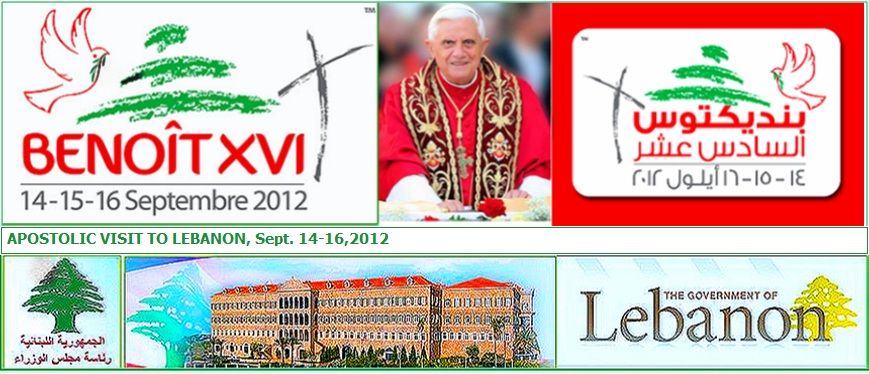 Pope's trip showcases
Pope's trip showcases
another face of the Middle East
by John L Allen Jr

Sept. 14, 2012
BEIRUT -- When Pope Benedict XVI arrived today at Beirut’s Rafic Hariri airport, the VIP delegation awaiting him consisted of both Christian patriarchs and Muslim clerics, all of whom mingled freely both before and after the welcoming ceremony. The Muslim leaders listened attentively, applauded warmly, and projected a general air of delight.
Later in the day, when the Pope went to a Greek Melkite basilica to sign the concluding document from a 2010 Synod of Bishops on the Middle East, the same visuals played out: bishops and muftis, patriarchs and imams, were all on hand.
TV coverage leading up the Pope’s arrival had shots of bishops and muftis slapping one another on the back, telling jokes, and sharing quiet conversation.
It’s not just the clerical establishment. Monsignor John Kozar, an American who heads the Catholic Near East Welfare Association and is in Lebanon for the Pope’s trip, told NCR he was in a shop recently where the owner identified himself as a Muslim and expressed support for the Pope’s arrival.
“The Pope is a man of peace,” Kozar quoted the owner as saying, “and we want him with us.”
These images of harmony, of course, come against the backdrop of a Middle East that in other ways seems to be on fire.
Anti-American violence has broken out in various parts of the Islamic world, including another region of Lebanon – Tripoli, about 45 miles to the north, where protestors torched a Kentucky Fried Chicken and a Hardees, and later, one person was killed and two injured in an attempted assault on a government building.
In that sense, Benedict’s visit amounts to a fortuitous way to showcase a different face of the Middle East -- gracious, open, and religious, without succumbing to fanaticism. Both it and the violent impulses currently sweeping across the region may be equally real, but the latter usually have a much higher media profile.
Saturday morning, the Pope is scheduled to meet a delegation of leaders of the four main Muslim communities in Lebanon – Sunni, Shi’ite, Druze and Alawites. Also joining the session will be Bechara Boutros al-Rai, Patriarch of the Maronite church, the largest of the Eastern churches here that are in communion with Rome.
In the streets of Beirut, the crowds who turned out to see the Pope on his arrival appeared to be a roughly equal mix of Christians and Muslims. One young Lebanese man, who identified himself as a Sunni Muslim, told NCR he came out to see the Pope because he knew the visit was important to his Catholic friends, and he wanted to show support.
Malek Mawlawi, head of a youth-oriented Muslim-Christian dialogue committee in Lebanon, said that the overwhelming majority of the country’s Muslims want the visit to go well – in part, he said, to project a positive image of Lebanon on the world stage, and in part to keep the delicate inter-religious peace.
Granted, not every Muslim voice appears thrilled. Earlier, radical sheikh Sheikh Omar Bakri had called on Muslims to prevent the Pope from entering the country, saying that a 2006 speech by Benedict in Regensburg, Germany, in which the Pope quoted a Byzantine emperor linking Muhammad to violence, amounted to “insulting Islam.”
Lebanese journalist Michel Hajji Georgiou, however, said that aside from a few critics – some radical Islamists, and some avowed secularists – most Lebanese do still value their country’s reputation as a model of co-existence, and see the papal presence as somehow a confirmation of it.
Kozar said that despite security concerns, this is probably the “perfect time” for Benedict to be in the Middle East.
“As opposed to all the ugly things happening elsewhere, his visit shows there’s another way to address what bothers you,” Kozar said.
“This is the Church at its best,” he said. |
| |
 15/09/2012 15:28 15/09/2012 15:28 |
|
| | | OFFLINE | | Post: 25.498
Post: 7.993 | Registrato il: 28/08/2005
Registrato il: 20/01/2009 | Administratore | Utente Master | |
|
 Saturday, Sept. 15, 23rd Week in Ordinary Time
Saturday, Sept. 15, 23rd Week in Ordinary Time
MEMORIAL OF OUR LADY OF SORROWS
 MATER DOLOROSA - OUR LADY OF SORROWS
Illustrations, from left: Greek icon, undated; Mater Dolorosa, El Greco, 1565; Pieta, Michelangelo, 1496; Pieta, William Bouguereau, 2876; Mater Dolorosa, Carlo Dolci, 1650; Our Lady of Sorrows, prayer card.
For a while there were two feasts in honor of the Sorrowful Mother: one going back to the 15th century, the other to the 17th century. For a while both were celebrated by the universal Church: one on the Friday before Palm Sunday, the other in September. The principal biblical references to Mary's sorrows are in Luke 2:35 and John 19:26-27. The Lucan passage is Simeon's prediction about a sword piercing Mary's soul; the Johannine passage relates Jesus's words to Mary and to the beloved disciple. Many early Church writers interpret the sword as Mary's sorrows, especially as she saw Jesus die on the cross. Thus, the two passages are brought together as prediction and fulfillment. St. Ambrose saw Mary as a sorrowful yet powerful figure at the cross. Mary stood fearlessly at the cross while others fled. Mary looked on her Son's wounds with pity, but saw in them the salvation of the world. As Jesus hung on the cross, Mary did not fear to be killed but offered herself to her persecutors.
MATER DOLOROSA - OUR LADY OF SORROWS
Illustrations, from left: Greek icon, undated; Mater Dolorosa, El Greco, 1565; Pieta, Michelangelo, 1496; Pieta, William Bouguereau, 2876; Mater Dolorosa, Carlo Dolci, 1650; Our Lady of Sorrows, prayer card.
For a while there were two feasts in honor of the Sorrowful Mother: one going back to the 15th century, the other to the 17th century. For a while both were celebrated by the universal Church: one on the Friday before Palm Sunday, the other in September. The principal biblical references to Mary's sorrows are in Luke 2:35 and John 19:26-27. The Lucan passage is Simeon's prediction about a sword piercing Mary's soul; the Johannine passage relates Jesus's words to Mary and to the beloved disciple. Many early Church writers interpret the sword as Mary's sorrows, especially as she saw Jesus die on the cross. Thus, the two passages are brought together as prediction and fulfillment. St. Ambrose saw Mary as a sorrowful yet powerful figure at the cross. Mary stood fearlessly at the cross while others fled. Mary looked on her Son's wounds with pity, but saw in them the salvation of the world. As Jesus hung on the cross, Mary did not fear to be killed but offered herself to her persecutors.
Readings for today's Mass:
www.usccb.org/bible/readings/091512.cfm
Day 2 of the Apostolic Visit to Lebanon
Saturday, Sept. 15

NB: #1 (Harissa) is also the location of the Apostolic Nunciature.
HARISSA
08.00 Private Mass at Apostolic Nunciature
BAABDA
10.00 COURTESY VISITS WITH LEBANESE LEADERS
Presidential Palace at Baabda
Separate private meetings with the President of the Republic,
the President of Parliament, and
the President of the Council of Ministers
10.50 MEETING WITH THE LEADERS OF THE MUSLIM RELIGIOUS COMMUNITIES
Hall of the Ambassadors, Presidential Palace
11.15 MEETING WITH LEADERS OF GOVERNMENT AND LEBANESE INSTITUTIONS,
THE DIPLOMATIC CORPS, RELIGIOUS LEADERS, AND
REPRESENTATIVES FROM THE WORLD OF CULTURE
May 25 Commemorative Hall, Presidential Palace
- Address by the Holy Father.
BZOMMAR
13.30 Lunch with the Patriarchs and Bishops of Lebanon,
Members of the Special Council for the Middle East
of the Bishops'Synod, and the papal delegation
Refectory of the Catholic Armenian Patriarchate
BKERKE
18.00 MEETING WITH YOUNG PEOPLE
Piazza facing the Maronite Patriarchate
- Address by the Holy Father
[Modificato da TERESA BENEDETTA 15/09/2012 16:27] |
| |
 15/09/2012 16:03 15/09/2012 16:03 |
|
| | | OFFLINE | | Post: 25.499
Post: 7.994 | Registrato il: 28/08/2005
Registrato il: 20/01/2009 | Administratore | Utente Master | |
|
 Day 2
Day 2
Outreach to Lebanon's civilian leaders
and leaders of the Muslim communities
Presidential Palace, Baabda
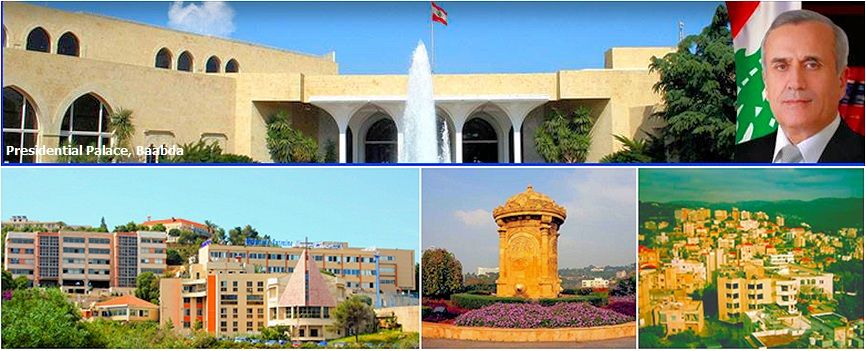 The Presidential Palace in Baabda is surrounded by military posts and the Defense Ministry building. In this mountain town southwest of Beirut are found most of the important government
The Presidential Palace in Baabda is surrounded by military posts and the Defense Ministry building. In this mountain town southwest of Beirut are found most of the important government
buildings of Lebanon, as well as many embassies, consulates, banks and business headquarters. It was the capital of the mountain state of Lebanon during the Ottoman Empire.

 The Pope arrives at the presidential palace in Baabda to a shower of petals and yellow-and-white confetti, for a series of meetings with Lebanon's political leaders,
The Pope arrives at the presidential palace in Baabda to a shower of petals and yellow-and-white confetti, for a series of meetings with Lebanon's political leaders,
civliian society and the leaders of the country's Muslim communities.
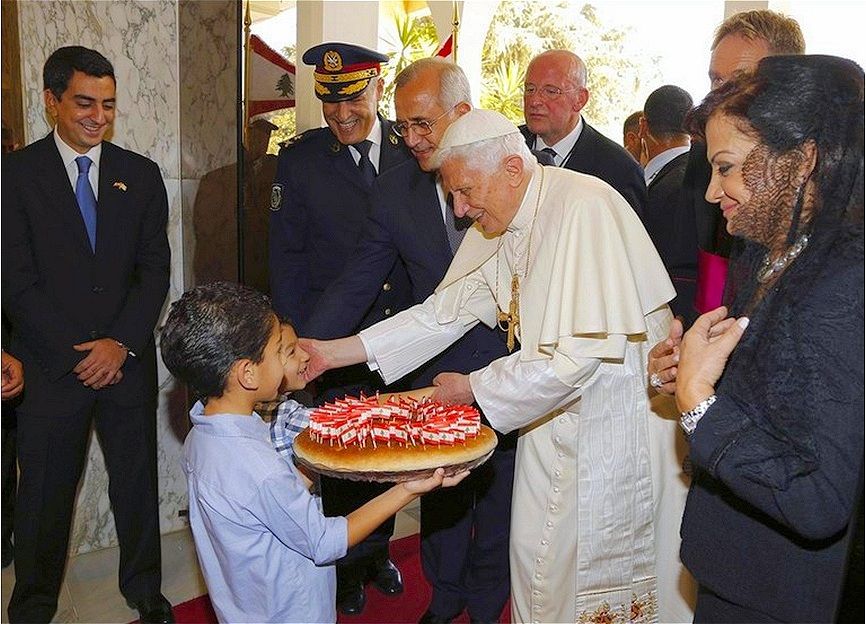
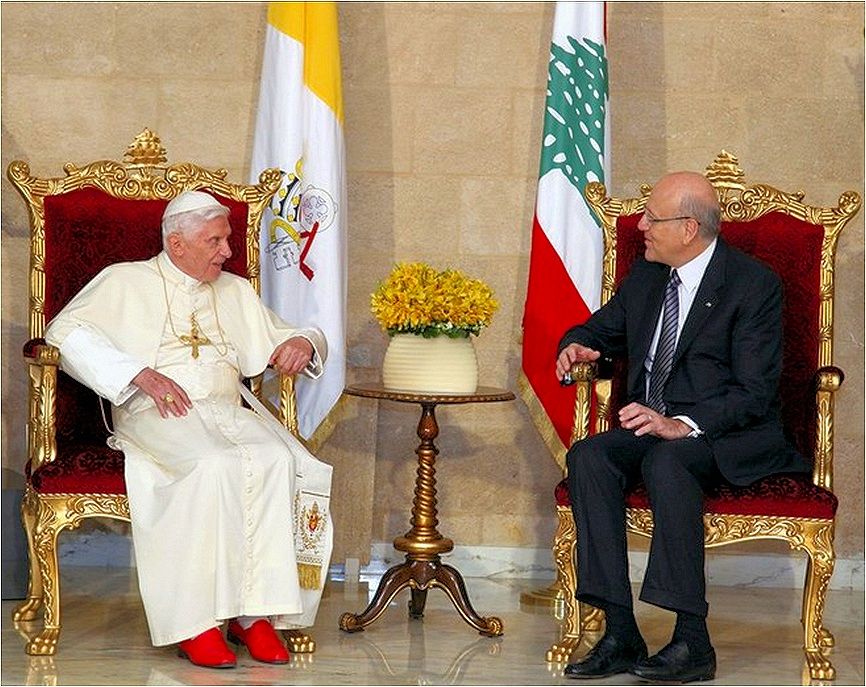 Two grandchildren of the President welcome the Pope with a cake decorated with Lebanese flags; and the Pope and the President during their private meeting.
Benedict XVI says multi-faith Lebanon
Two grandchildren of the President welcome the Pope with a cake decorated with Lebanese flags; and the Pope and the President during their private meeting.
Benedict XVI says multi-faith Lebanon
should be a model for the Middle East
by Philip Pullella and Tom Heneghan

BEIRUT. Sept. 15 (Reuters) - Pope Benedict urged multi-faith Lebanon on Saturday to be a model of peace and religious coexistence for the Middle East, which he called a turbulent region that "seems to endure interminable birth pangs".
The Pope, on the second day of a visit clouded by war in neighboring Syria and protests across the Muslim world, told a gathering of Lebanese political, religious and cultural leaders that religious freedom was a basic right for all people.
Christianity and Islam have lived together in Lebanon for centuries, he said, sometimes within one family. "If this is possible within the same family, why should it not be possible at the level of the whole of society?" he asked.
"Lebanon is called, now more than ever, to be an example," he said, inviting his audience "to testify with courage, in season and out of season, wherever you find yourselves, that God wants peace, that God entrusts peace to us".
Lebanon - torn apart by a 1975-1990 sectarian civil war - is a religious mosaic of over four million people whose Muslim majority includes Sunnis, Shi'ites and Alawites. Christians, over one-third of the population, are divided into more than a dozen churches, six of them linked to the Vatican.
The German-born pontiff, 85, delivered his speech in French at the presidential palace after meeting President Michel Suleiman, a Maronite Christian, Sunni Prime Minister Najib Mikati and parliamentary speaker Nabih Berri, a Shi'ite.
Outside the palace, a Muslim onlooker named Amira Chabchoul said: "We came to support the Pope and also get support from him, because our experience has been that when we listen to him, we are touched and we are helped in our lives."
On Friday hundreds of protesters against an anti-Islam film dodged gunfire and teargas to hurl stones at security forces in Lebanon's Tripoli where one demonstrator was killed and two injured. Protesters chanted "We don't want the Pope" and "No more insults (to Islam)".
In his remarks, Suleiman said the Syrian people should be able to "attain what they desire in terms of reform, freedom, democracy ... through the appropriate dialogue and political means, away from any form of violence and coercion".
Benedict began his visit on Friday with a call for an end to all arms supplies to Syria, where the tiny Christian minority fears reprisals if Islamists come to power at the end of the bloody insurgency against President Bashar al-Assad.
He also described the Arab Spring movement as a "cry for freedom" that was a positive development as long as it ensured tolerance for all religions.
Coptic Christians, about 10 percent of Egypt's population, have come under repeated attack by Islamists since the overthrow of former President Hosni Mubarak. They worry the new government will strengthen Islamic law in the new constitution.
In Egypt, Libya and Tunisia, hardline Salafis have brought a new religious intolerance against fellow Muslims such as Sufis, whose shrines they are destroying as heretical.
Benedict avoided mentioning specific cases, but spelled out clearly the moral reasoning against violence and radicalism.
"If we want peace, let us defend life," he said. "This approach leads us to reject not only war and terrorism, but every assault on innocent human life."
Before his speech, Benedict held a private meeting with leaders of the Sunni, Shi'ite and Alawite Muslim communities and of the Druze, an offshoot of Shi'ism with other influences.
All main religious groups, including the militant Shi'ite Hezbollah movement, assured the Vatican in advance of their support for the trip and their representatives have attended several of the Pope's events with other faith leaders.
Once again, an Arab news agency has the better story compared to the Reuters report, though I must thank Pullella and Heneghan for not bringing up Regensburg!...
Pope urges Mideast Christians and Muslims
to forge a harmonious society

Beirut, Sept. 15 (Al-Arabiya News) - Balloons and white doves were released in the air as Pope Benedict XVI reached the entrance of Lebanon’s Presidential Palace on Saturday, in a visit to meet leaders of Lebanon's Muslim communities.
On the steps of the palace, in the Beirut suburb of Baabda, the Pope first met with President Michel Sleiman and his wife.
Lebanese Prime Minister Najib Mikati and the Parliament Speaker also arrived with their families to greet the Pope, as well as the leader of Lebanon's Druze (muslim) community, Walid Jumblatt.
The Pope was met with crowds of supporters, in their thousands, waving Lebanese and Vatican flags to welcome the Pontiff.
The visit is aimed in part at bridging the gap between Christians and Muslims in the Middle East.
Pope Benedict said on Saturday that mankind should reject vengeance and instead pardon the offences of others, as he urged the Middle East’s Christians and Muslims to forge a harmonious society.
Those who desire to live in peace must have a change of heart, and that involves “rejecting revenge, acknowledging one’s faults, accepting apologies without demanding them and, not least, forgiveness,” he said.
“Only forgiveness, given and received, can lay lasting foundations for reconciliation and universal peace,” he added in an address on the second day of his three-day visit to Lebanon.
The Pontiff issued his call in a speech to Lebanon’s political and religious leaders as well as the diplomatic corps after meeting with them at the presidential palace on the second day of his three-day visit to Lebanon.
To that end, cultural, social and religious differences should lead to a new kind of fraternity “wherein what rightly unites us is a shared sense of the greatness of each person and the gift which others are to themselves, to those around them and to all humanity.”
“Verbal and physical violence must be rejected, for these are always an assault on human dignity, both of the perpetrator and the victim.”
He noted that Christians and Muslims have lived side by side in the Middle East for centuries and that there is room for a pluralistic society.
“It is not uncommon to see the two religions within the same family. If this is possible within the same family, why should it not be possible at the level of the whole of society?
“The particular character of the Middle East consists in the centuries-old mix of diverse elements. Admittedly, they have fought one another, sadly that is also true. A pluralistic society can only exist on the basis of mutual respect, the desire to know the other and continuous dialogue.”
Central to that, the freedom “to profess and practice one’s religion without danger to life and liberty must be possible to everyone. The loss or attenuation of this freedom deprives the person of his or her sacred right to a spiritually integrated life.”
His address focused on the universal yearning of humanity for peace and how that can only come about through community, comprised of individual persons, whose aspirations and rights to a fulfilling life must be respected.
The encounter has been particularly poignant coming after several days of deadly violence as Muslims have protested against a U.S.-made film that mocks Islam.
Crowds stood behind a security barrier adorned with Lebanese and Vatican flags. Several triumphal arches extended from one side of the street to the other.
A statement by Baabda Presidential Palace said Sleiman “urges all citizens to gather starting 8 a.m. [Saturday] along the street leading to the Presidential Palace through which the Popemobile carrying the great visitor will pass, in order to catch a glimpse of [the Pope] and receive his blessing.”
Lebanon is a multi-faith country in which Muslims make up about 65 percent of the population and Christians the balance. The Pope came to bring a message of peace and reconciliation to it and to the wider Middle East, which have been torn by violence, often sectarian, over the years.
“Why did God choose these lands? Why is their life so turbulent,” he asked.
“God chose these lands, I think, to be an example, to bear witness before the world that every man and woman has the possibility of concretely realizing his or her longing for peace and reconciliation. This aspiration is part of God’s eternal plan and he has impressed it deep within the human heart.”
The Pope said the conditions for building and consolidating peace must be grounded in the dignity of
The Pontiff, who arrived on Friday for a three-day visit, praised Lebanon as an example of “coexistence and respectful dialogue between Christians and their brethren of other religions” when he arrived at the airport.
Without referring expressly to the unrest, the pope warned that the country’s “equilibrium” is “extremely delicate.”
Lebanon has the largest Christian minority in the Middle East — forming around 40 percent of the country’s 4 million citizens. Even before this week’s anti-Western attacks, the country’s complex balance of religious and political groups was threatened by neighboring Syria’s descent into civil war.
Lebanon has an unwritten but rigorously followed tradition that the three top jobs are always reserved for members of those respective faith communities.
Thousands of people, mostly Christians and including many children, lined the road leading to the palace in bright but pleasant sunshine, hoping to catch a glimpse of the pope.
Lebanese and Vatican flags fluttered, and there was a festive atmosphere on the streets.
Zeina Khoury, a Maronite who lives nearby, said she, her husband and two children got up at 6:00 am to make sure they could find a place along the route.
"This is a blessing for Lebanon," she said. The Pope's visit is "important because it can bring us peace and because it reminds us of the importance of living together."
"I brought my children to see the Pope ... because it could be the only chance they will ever have in their life."
Here is the official Vatican translation of the Pope's address:
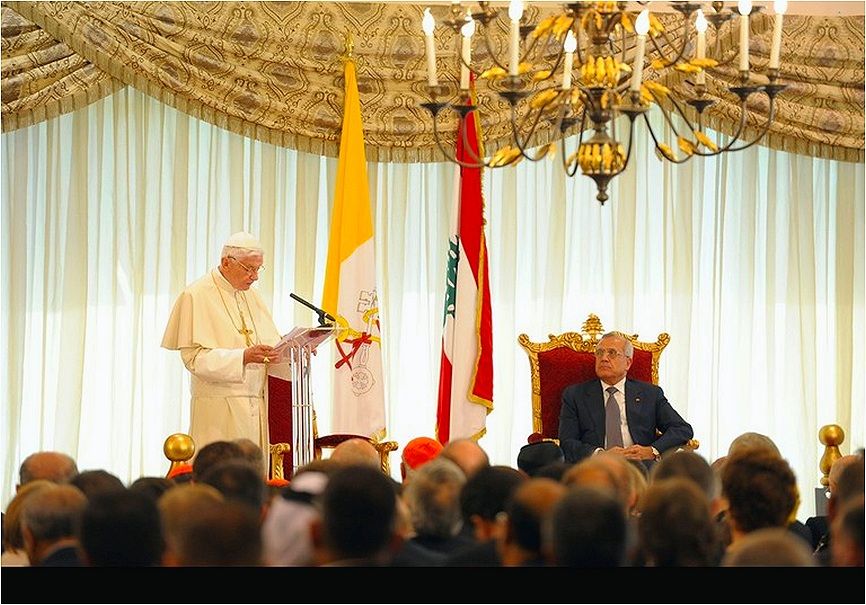 Mr President,
Mr President,
Representatives of the Parliamentary, Governmental,
Institutional and Political Authorities of Lebanon,
Chiefs of Diplomatic Missions,
Your Beatitudes,
Religious Leaders,
Brother Bishops,
Ladies and Gentlemen,
Dear Friends,
سَلامي أُعطيكُم [My peace I give to you!] (Jn 14:27)
With these words of Christ Jesus, I greet you and I thank you for your presence and your warm welcome. Mr President, I am grateful to you not only for your cordial words of welcome but also for having allowed this meeting to take place.
With you, I have just planted a cedar of Lebanon, the symbol of your beautiful country. In looking at this sapling, and thinking of the care which it will need in order to grow and stretch forth its majestic branches, I think of this country and its future, the Lebanese people and their hopes, and all the people of this region which seems to endure interminable birth pangs.
I have asked God to bless you, to bless Lebanon and all who dwell in these lands which saw the birth of great religions and noble cultures.
Why did God choose these lands? Why is their life so turbulent? God chose these lands, I think, to be an example, to bear witness before the world that every man and woman has the possibility of concretely realizing his or her longing for peace and reconciliation!
This aspiration is part of God’s eternal plan and he has impressed it deep within the human heart. So I would like to speak to you about peace, echoing Jesus’s invocation: سَلامي أُعطيكُم [My peace I give to you].
The wealth of any country is found primarily in its inhabitants. The country’s future depends on them, individually and collectively, as does its capacity to work for peace. A commitment to peace is possible only in a unified society.
Unity, on the other hand, is not the same as uniformity. Social cohesion requires unstinting respect for the dignity of each person and the responsible participation of all in contributing the best of their talents and abilities.
The energy needed to build and consolidate peace also demands that we constantly return to the wellsprings of our humanity. Our human dignity is inseparable from the sacredness of life as the gift of the Creator.
In God’s plan, each person is unique and irreplaceable. A person comes into this world in a family, which is the first locus of humanization, and above all the first school of peace. To build peace, we need to look to the family, supporting it and facilitating its task, and in this way promoting an overall culture of life.
The effectiveness of our commitment to peace depends on our understanding of human life. If we want peace, let us defend life! This approach leads us to reject not only war and terrorism, but every assault on innocent human life, on men and women as creatures willed by God.
Wherever the truth of human nature is ignored or denied, it becomes impossible to respect that grammar which is the natural law inscribed in the human heart (cf. Message for the 2007 World Day of Peace, 3).
The grandeur and the raison d’être of each person are found in God alone. The unconditional acknowledgement of the dignity of every human being, of each one of us, and of the sacredness of human life, is linked to the responsibility which we all have before God. We must combine our efforts, then, to develop a sound vision of man, respectful of the unity and integrity of the human person. Without this, it is impossible to build true peace.
While more evident in countries which are experiencing armed conflict – those wars so full of futility and horror – there are assaults on the integrity and the lives of individuals taking place in other countries too.
Unemployment, poverty, corruption, a variety of addictions, exploitation, different forms of trafficking, and terrorism not only cause unacceptable suffering to their victims but also a great impoverishment of human potential.
We run the risk of being enslaved by an economic and financial mindset which would subordinate “being” to “having”! The destruction of a single human life is a loss for humanity as a whole.
Mankind is one great family for which all of us are responsible. By questioning, directly or indirectly, or even before the law, the inalienable value of each person and the natural foundation of the family, some ideologies undermine the foundations of society.
We need to be conscious of these attacks on our efforts to build harmonious coexistence. Only effective solidarity can act as an antidote, solidarity that rejects whatever obstructs respect for each human being, solidarity that supports policies and initiatives aimed at bringing peoples together in an honest and just manner. It is heartening to see examples of cooperation and authentic dialogue bearing fruit in new forms of coexistence.
A better quality of life and integral development are only possible when wealth and competences are shared in a spirit of respect for the identity of each individual. But this kind of cooperative, serene and animated way of life is impossible without trust in others, whoever they may be.
Nowadays, our cultural, social and religious differences should lead us to a new kind of fraternity wherein what rightly unites us is a shared sense of the greatness of each person and the gift which others are to themselves, to those around them and to all humanity. This is the path to peace! This is the commitment demanded of us! This is the approach which ought to guide political and economic decisions at every level and on a global scale!
In order to make possible a future of peace for coming generations, our first task is to educate for peace in order to build a culture of peace. Education, whether it takes place in the family or at school, must be primarily an education in those spiritual values which give the wisdom and traditions of each culture their ultimate meaning and power.
The human spirit has an innate yearning for beauty, goodness and truth. This is a reflection of the divine, God’s mark on each person! This common aspiration is the basis for a sound and correct notion of morality, which is always centred on the person.
Yet men and women can turn towards goodness only of their own free will, for “human dignity requires them to act out of a conscious and free choice, as moved in a personal way from within, and not by their own blind impulses or by exterior constraint” (Gaudium et Spes, 17).
The goal of education is to guide and support the development of the freedom to make right decisions, which may run counter to widespread opinions, the fashions of the moment, or forms of political and religious ideology. This is the price of building a culture of peace!
Evidently, verbal and physical violence must be rejected, for these are always an assault on human dignity, both of the perpetrator and the victim. Emphasizing peacemaking and its positive effect for the common good also creates interest in peace.
As history shows, peaceful actions have a significant effect on local, national and international life. Education for peace will form men and women who are generous and upright, attentive to all, especially those most in need.
Thoughts of peace, words of peace and acts of peace create an atmosphere of respect, honesty and cordiality, where faults and offences can be truthfully acknowledged as a means of advancing together on the path of reconciliation. May political and religious leaders reflect on this!
We need to be very conscious that evil is not some nameless, impersonal and deterministic force at work in the world. Evil, the devil, works in and through human freedom, through the use of our freedom. It seeks an ally in man. Evil needs man in order to act.
Having broken the first commandment, love of God, it then goes on to distort the second, love of neighbour. Love of neighbour disappears, yielding to falsehood, envy, hatred and death. But it is possible for us not to be overcome by evil but to overcome evil with good (cf. Rom 12:21).
It is to this conversion of heart that we are called. Without it, all our coveted human “liberations” prove disappointing, for they are curtailed by our human narrowness, harshness, intolerance, favouritism and desire for revenge.
A profound transformation of mind and heart is needed to recover a degree of clarity of vision and impartiality, and the profound meaning of the concepts of justice and the common good.
A new and freer way of looking at these realities will enable us to evaluate and challenge those human systems which lead to impasses, and to move forward with due care not to repeat past mistakes with their devastating consequences.
The conversion demanded of us can also be exhilarating, since it creates possibilities by appealing to the countless resources present in the hearts of all those men and women who desire to live in peace and are prepared to work for peace.
True, it is quite demanding: it involves rejecting revenge, acknowledging one’s faults, accepting apologies without demanding them, and, not least, forgiveness. Only forgiveness, given and received, can lay lasting foundations for reconciliation and universal peace (cf. Rom 12:16b,18).
Only in this way can there be growth in understanding and harmony between cultures and religions, and in genuine mutual esteem and respect for the rights of all.
In Lebanon, Christianity and Islam have lived side by side for centuries. It is not uncommon to see the two religions within the same family. If this is possible within the same family, why should it not be possible at the level of the whole of society?
The particular character of the Middle East consists in the centuries-old mix of diverse elements. Admittedly, they have fought one another, sadly that is also true. A pluralistic society can only exist on the basis of mutual respect, the desire to know the other, and continuous dialogue.
Such dialogue is only possible when the parties are conscious of the existence of values which are common to all great cultures because they are rooted in the nature of the human person. This substratum of values expresses man’s true humanity. These values are inseparable from the rights of each and every human being.
By upholding their existence, the different religions make a decisive contribution. It cannot be forgotten that religious freedom is the basic right on which many other rights depend.
The freedom to profess and practise one’s religion without danger to life and liberty must be possible to everyone. The loss or attenuation of this freedom deprives the person of his or her sacred right to a spiritually integrated life.
What nowadays passes for tolerance does not eliminate cases of discrimination, and at times it even reinforces them. Without openness to transcendence, which makes it possible to find answers to their deepest questions about the meaning of life and morally upright conduct, men and women become incapable of acting justly and working for peace.
Religious freedom has a social and political dimension which is indispensable for peace! It promotes a harmonious life for individuals and communities by a shared commitment to noble causes and by the pursuit of truth, which does not impose itself by violence but rather “by the force of its own truth” (Dignitatis Humanae, 1): the Truth which is in God.
A lived faith leads invariably to love. Authentic faith does not lead to death. The peacemaker is humble and just. Thus believers today have an essential role, that of bearing witness to the peace which comes from God and is a gift bestowed on all of us in our personal, family, social, political and economic life (cf. Mt 5:9; Heb 12:14).
The failure of upright men and women to act must not permit evil to triumph. It is worse still to do nothing.
These few reflections on peace, society, the dignity of the person, the values of family life, dialogue and solidarity, must not remain a simple statement of ideals. They can and must be lived out.
We are in Lebanon, and it is here that they must be lived out. Lebanon is called, now more than ever, to be an example.
And so I invite you, politicians, diplomats, religious leaders, men and women of the world of culture, to testify with courage, in season and out of season, wherever you find yourselves, that God wants peace, that God entrusts peace to us. سَلامي أُعطيكُم [My peace I give to you] (Jn 14:27) says Christ! May God bless you! Thank you![
WOW! Benedict XVI is exemplary in preaching the Christian message as a universal one, underscoring the common values shared by all men under natural law but not shying away from pointing to Jesus Christ and to God, even in a speech that is meant to be secular.
[Modificato da TERESA BENEDETTA 17/09/2012 02:32] |
| |
 16/09/2012 12:11 16/09/2012 12:11 |
|
| | | OFFLINE | | Post: 25.500
Post: 7.995 | Registrato il: 28/08/2005
Registrato il: 20/01/2009 | Administratore | Utente Master | |
|
 Day 2
Day 2
Meeting with Muslim leaders
Presidential Palace, Baabda
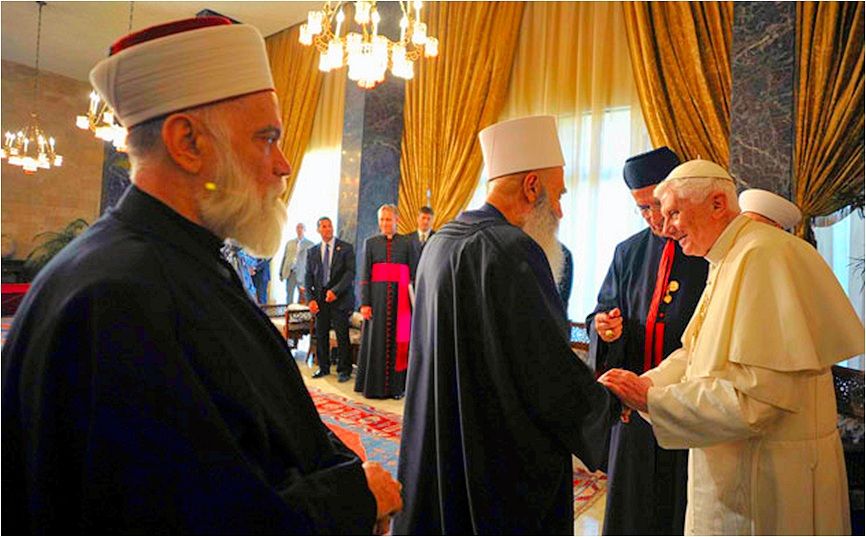 Muslims want Christians
Muslims want Christians
in the Middle East,
mufti tells Pope
by John L Allen Jr

Sept. 15, 2012
BEIRUT = Though everyone expected that Benedict XVI, while he was in the neighborhood, would express a preference that Christians not abandon the Middle East, the same point has now been made by one of his opposite numbers on the Muslim side.
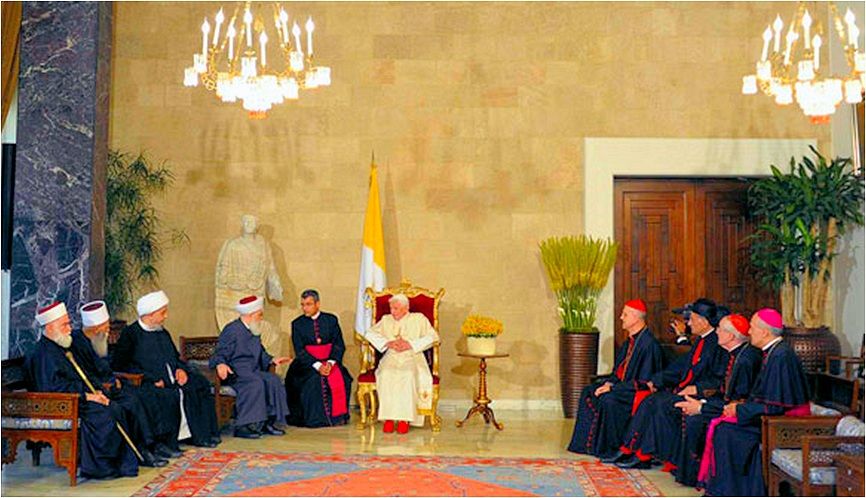
In a meeting this morning with the Pope, Mufti Mohammad Rachid Kabbani, whose title is “Mufti of the Lebanese Republic,” told Benedict that Muslims “absolutely do not want Christians to leave the Middle East,” according to Jesuit Fr. Federico Lombardi, the Vatican spokesperson.
Benedict’s meeting this morning with leaders of Lebanon’s four main branches of Islam – Sunni, Shi’ite, Druze and Alawit – took place behind closed doors at Beirut’s Presidential Palace, but Lombardi briefed reporters afterwards on its high points.
According to Lombardi, the mufti also expressed appreciation for a recent Vatican statement expressing sympathy for Muslims offended by a recent obscure American film attacking Islam, which has been cited as a pretext for the anti-American violence spreading across the Islamic world.
That statement, issued last week, came under fire from critics who saw it as almost excusing the attacks in Libya which led to the death of the U.S. ambassador and other American personnel. A day later the Vatican issued another statement clearly condemning those attacks.
Finally, according to Lombardi, the mufti also praised a recent comment by Patriarch Béchara Boutros Raï, leader of Lebanon’s Maronite church, that Christians and Muslims need to move beyond “co-existence” toward “genuine communion and unity.”
[Modificato da TERESA BENEDETTA 16/09/2012 13:23] |
| |
 16/09/2012 13:10 16/09/2012 13:10 |
|
| | | OFFLINE | | Post: 25.501
Post: 7.996 | Registrato il: 28/08/2005
Registrato il: 20/01/2009 | Administratore | Utente Master | |
|
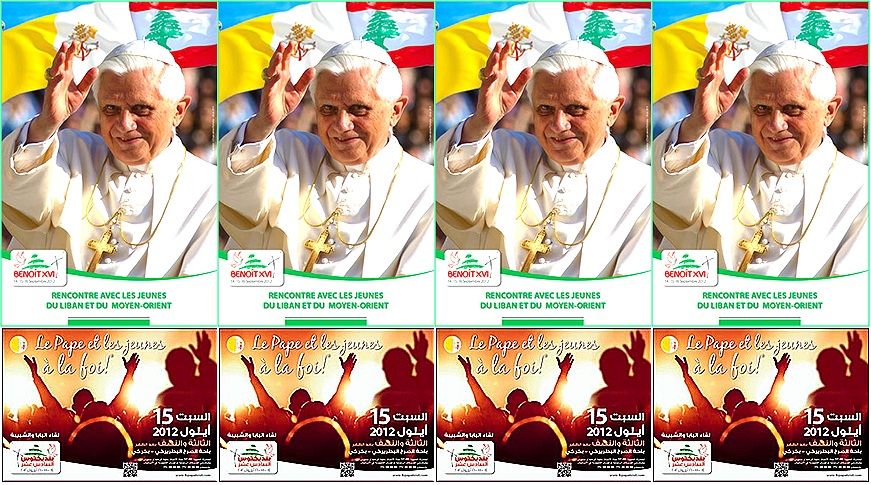 Day 2
Day 2
Meeting with young people
of Lebanon and the Middle East
Maronite Patriarchate, Bkerke
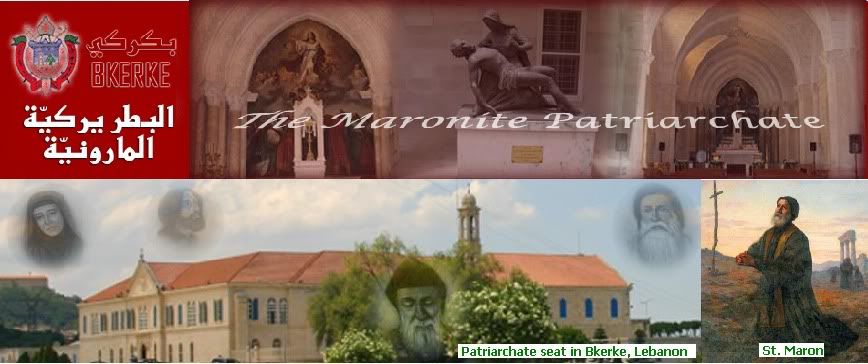 Bkerke overlooks the city of Beirut.
Bkerke overlooks the city of Beirut.
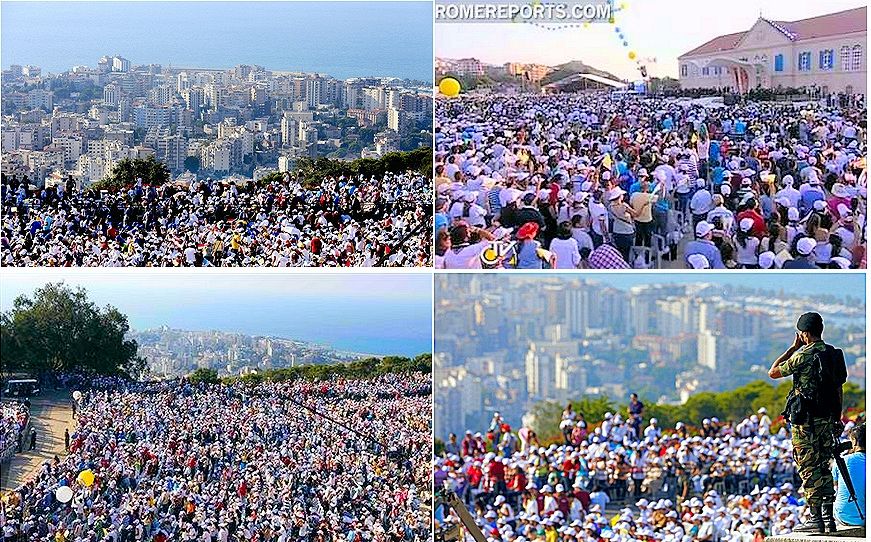
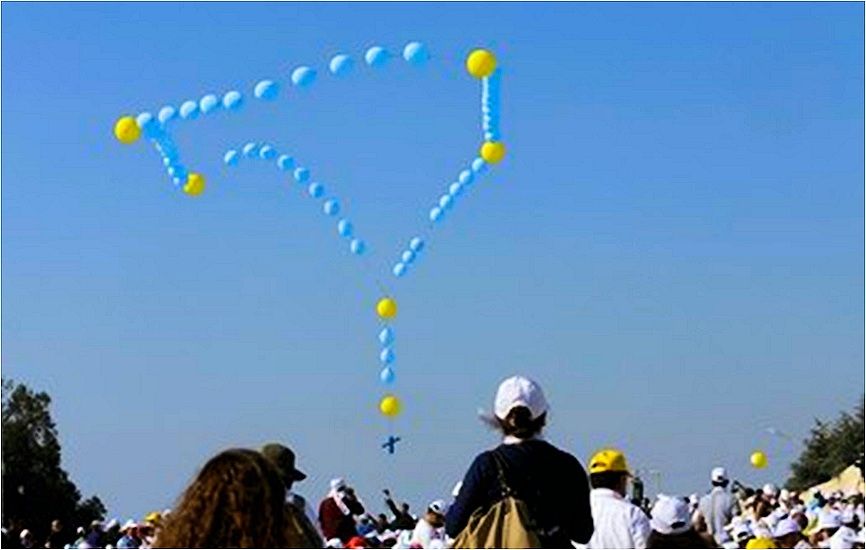
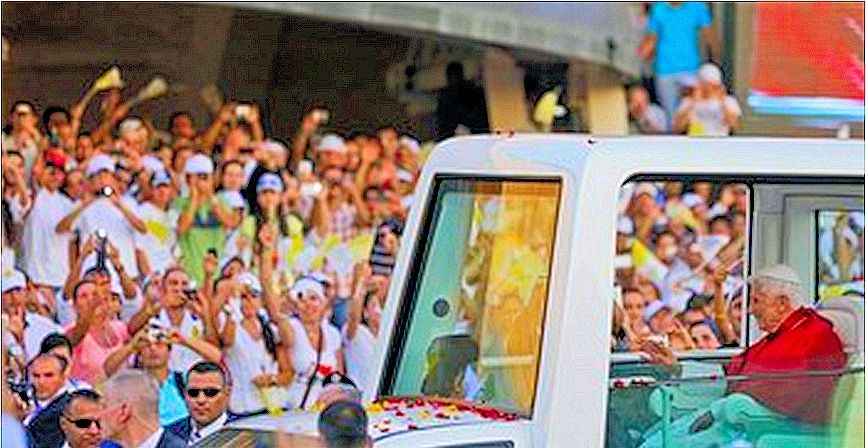
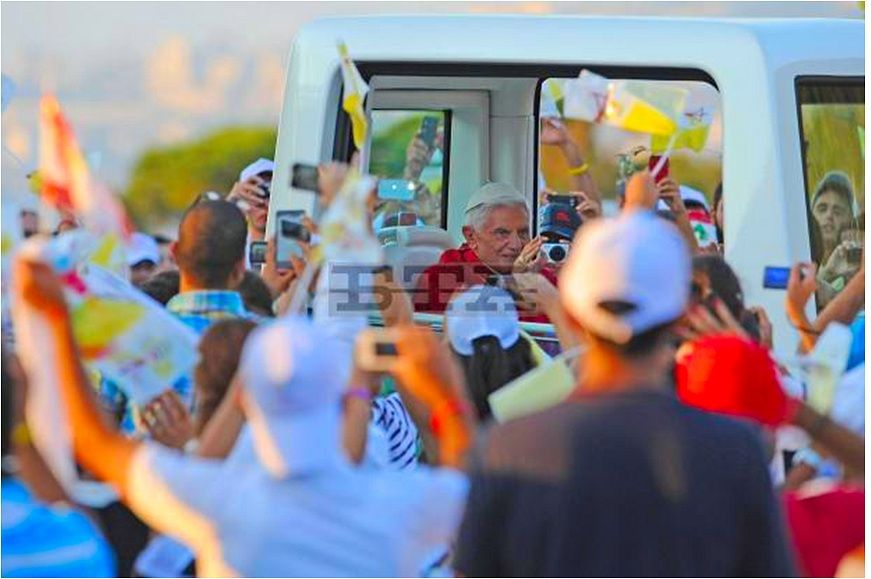
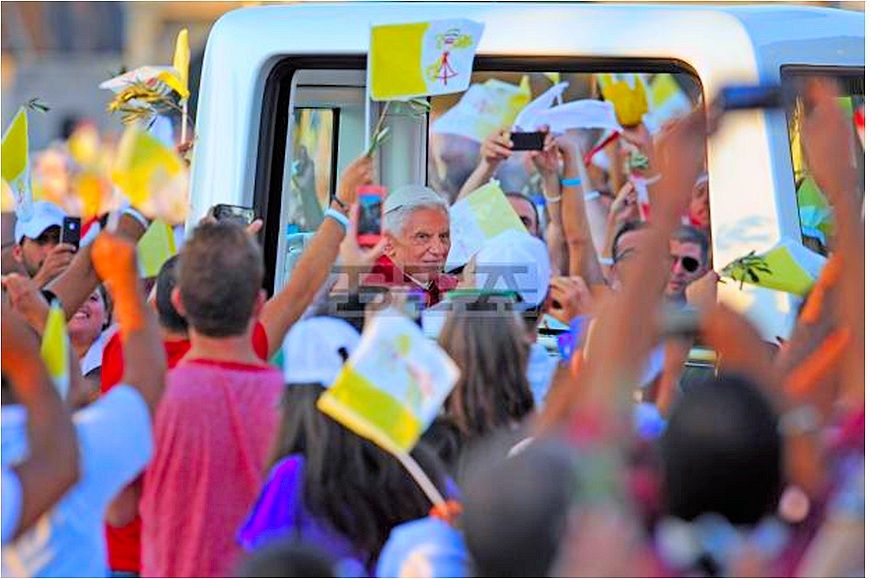 Benedict XVI calls on young
Benedict XVI calls on young
Middle Eastern Christians:
'Stay and make peace'
by Francis X. Rocca

BKERKE, Lebanon, Sept. 15 (CNS) -- Pope Benedict XVI urged young Christians in the Middle East not to flee violence and economic insecurity through emigration, but to draw strength from their faith and make peace in their troubled region.
The Pope spoke to some 20,000 young people from several Middle Eastern countries gathered outside the residence of the Maronite patriarch in Bkerke.
The crowd began to form hours before Pope Benedict arrived in the popemobile a little after 6 p.m. As they waited, the young people sang, including a song: "From Rome you came to Lebanon, bringing the peace with you. We came from all over just to tell you that you are the one who is holding us together."
Pope Benedict began his remarks with a direct plea to young Middle East Christians, whose population is diminishing across the region, not to abandon their homelands.
"Not even unemployment and uncertainty should lead you to taste the bitter sweetness of emigration, which involves an uprooting and a separation for the sake of an uncertain future," he said. "You are meant to be protagonists of your country's future and to take your place in society and in the church."
Warning against escapism, the Pope urged his listeners not to "take refuge in parallel worlds like those, for example, of the various narcotics or the bleak world of pornography."
He acknowledged that online social networks are interesting, but said they "can quite easily lead to addiction and confusion between the real and the virtual." He called money a "tyrannical idol which blinds to the point of stifling the person at the heart."
Offering encouragement, the Pope invoked the inspiration of the first Christians, inhabitants of the Middle East who "lived in troubled times and their faith was the source of their courage and their witness."
"Courageously resist everything opposed to life: abortion, violence, rejection of and contempt for others, injustice and war," Pope Benedict said. "In this way you will spread peace all around you."
Toward the end of his remarks, the Pope offered a word of thanks to the Muslims in attendance, urging them to work with their Christian contemporaries to build up the region.
"Muslims and Christians, Islam and Christianity, can live side by side without hatred, with respect for the beliefs of each person, so as to build together a free and humane society," the Pope said.
Among the groups performing at the service was a mixed Muslim-Christian choir from the northern city of Tripoli, where the previous day a protest against an American-made anti-Muslim film had led to clashes that left at least one dead and 25 wounded.
Pope Benedict also acknowledged the presence of young Christians from neighboring Syria, where civil war has left thousands dead and displaced hundreds of thousands of refugees since March 2011.
"The Pope is saddened by your sufferings and your grief," he said, his first public reference to the Syrian conflict since he arrived in Lebanon. "It is time for Muslims and Christians to come together so as to put an end to violence and war."
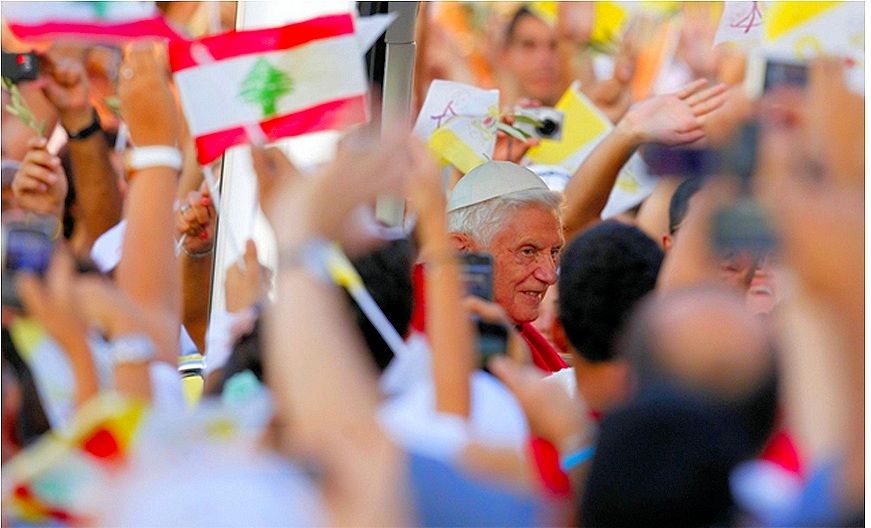

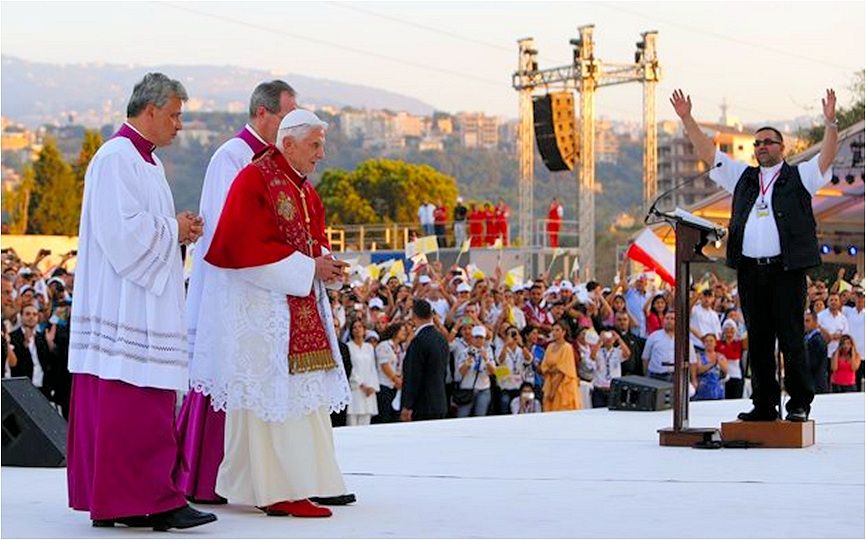
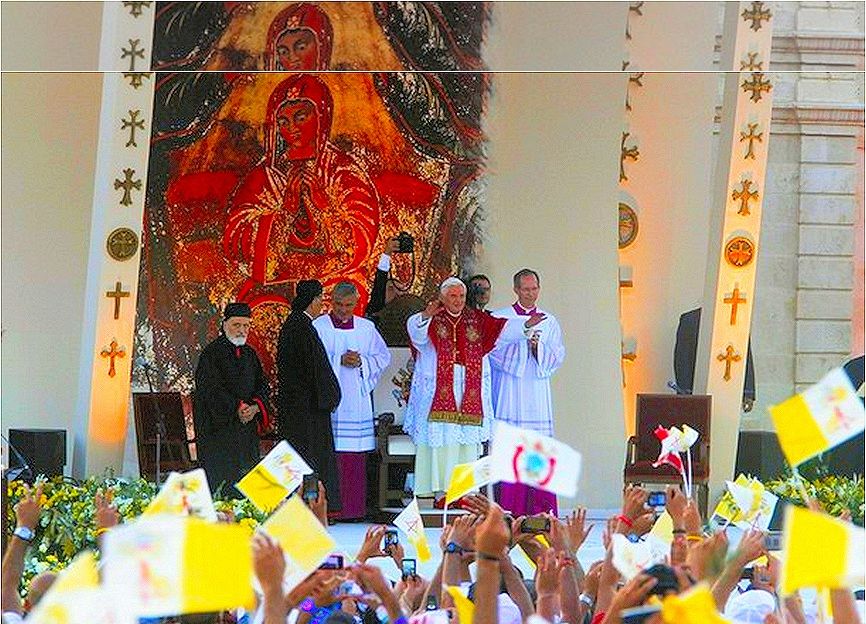
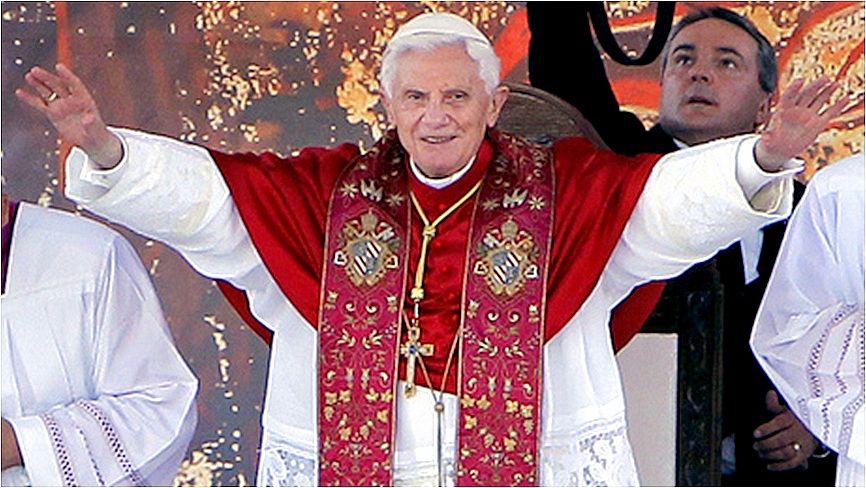
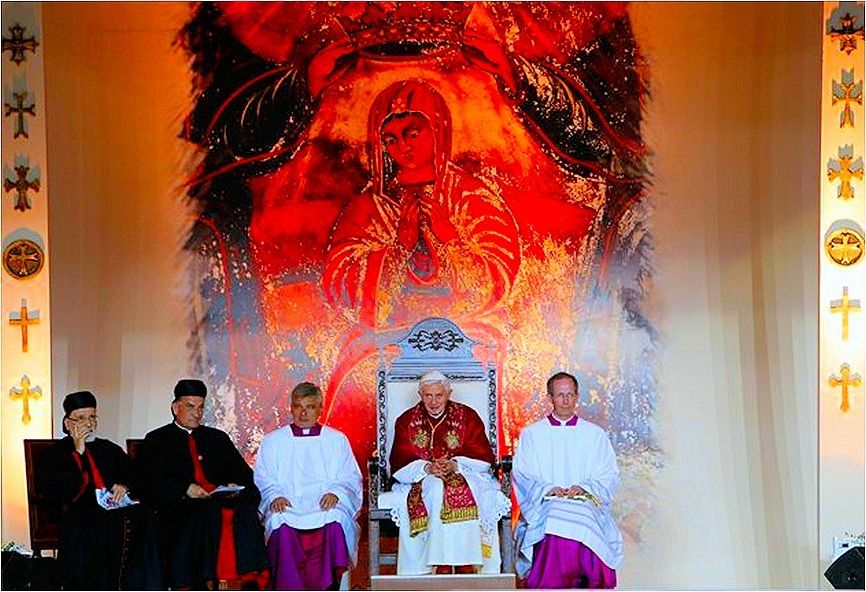
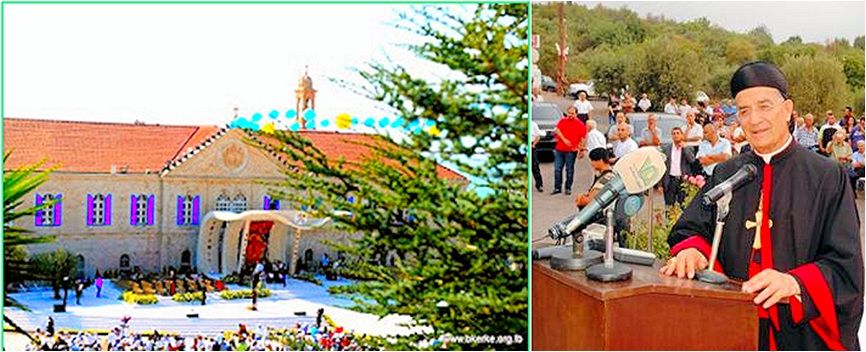
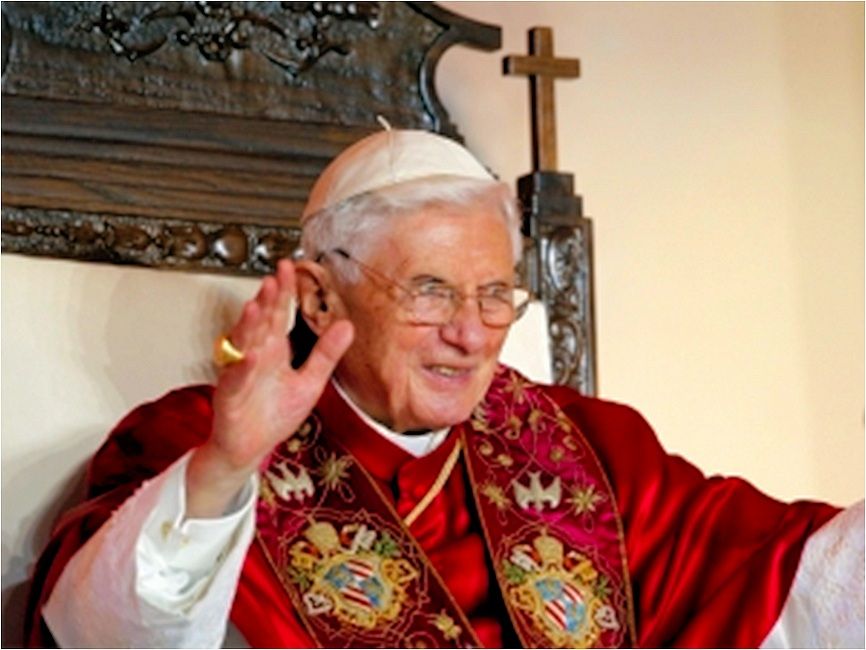


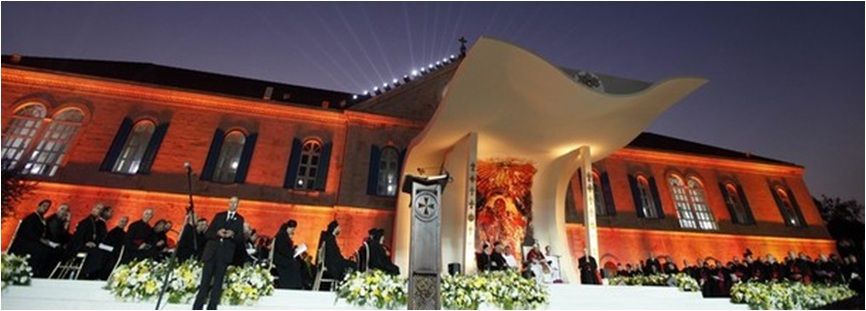
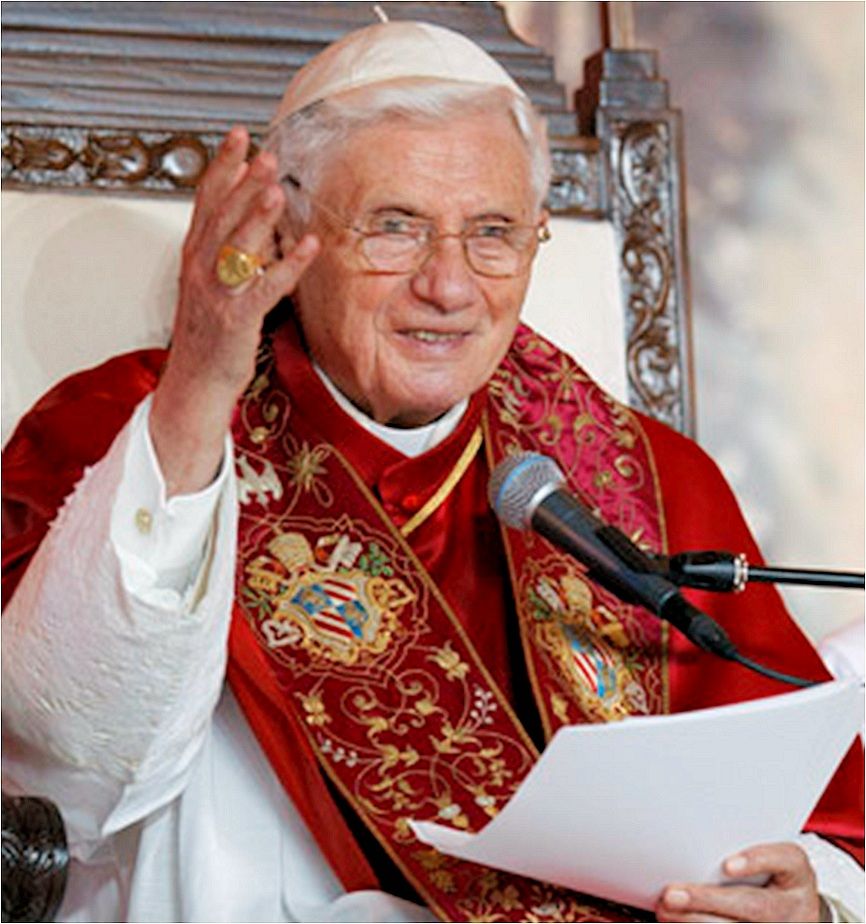 Here is the Vatican translation of the Pope's address:
Here is the Vatican translation of the Pope's address:
Your Beatitude, Brother Bishops, Dear Friends,
“May grace and peace be multiplied to you in the knowledge of God and of Jesus Christ our Lord” (2 Pet 1:2). The words from the Second Letter of Saint Peter that we have just heard express a desire which I have long felt.
Thank you for your warm welcome! I thank you most kindly for your presence in such great numbers this evening! I am grateful to His Beatitude Patriarch Bechara Boutros Raï for his words of welcome, to Archbishop Georges Bou-Jaoudé of Tripoli, the President of the Council for the Lay Apostolate in Lebanon, to Archbishop Elie Haddad of Saïdā of the Greek Melkites, Vice President of the same Council, and to the two young people who greeted me in the name of all present.
سَلامي أُعطيكُم – My peace I give to you! (Jn 14:27), Christ Jesus says to us.
Dear friends, you are living today in this part of the world which witnessed the birth of Jesus and the growth of Christianity. It is a great honour! It is also a summons to fidelity, to love of this region and, above all, to your calling to be witnesses and messengers of the joy of Christ.
The faith handed down from the Apostles leads to complete freedom and joy, as the many Saints and Blesseds of this country have shown. Their message lights up the universal Church. It can light up your lives as well. Many of the Apostles and saints lived in troubled times and their faith was the source of their courage and their witness. Find in their example and intercession the inspiration and support that you need!
I am aware of the difficulties which you face daily on account of instability and lack of security, your difficulties in finding employment and your sense of being alone and on the margins. In a constantly changing world you are faced with many serious challenges.
But not even unemployment and uncertainty should lead you to taste the bitter sweetness of emigration, which involves an uprooting and a separation for the sake of an uncertain future. You are meant to be protagonists of your country’s future and to take your place in society and in the Church.
You have a special place in my heart and in the whole Church, because the Church is always young! The Church trusts you. She counts on you! Be young in the Church! Be young with the Church! The Church needs your enthusiasm and your creativity!
Youth is the time when we aspire to great ideals, when we study and train for our future work. All this is important and it takes time. Seek beauty and strive for goodness! Bear witness to the grandeur and the dignity of your body which “is for the Lord” (1 Cor 6:13b).
Be thoughtful, upright and pure of heart! In the words of Blessed John Paul II, I say to you: “Do not be afraid! Open the doors of your minds and hearts to Christ!” An encounter with Jesus “gives life a new horizon and a decisive direction” (Deus Caritas Est, 1).
In Christ you will find the strength and courage to advance along the paths of life, and to overcome difficulties and suffering. In him you will find the source of joy. Christ says to you: سَلامي أُعطيكُم – My peace I give to you! (Jn 14:27). This is the true revolution brought by Christ: that of love.
The frustrations of the present moment must not lead you to take refuge in parallel worlds like those, for example, of the various narcotics or the bleak world of pornography. As for social networks, they are interesting but they can quite easily lead to addiction and confusion between the real and the virtual.
Look for relationships of genuine, uplifting friendship. Find ways to give meaning and depth to your lives; fight superficiality and mindless consumption! You face another temptation, too: that of money, the tyrannical idol which blinds to the point of stifling the person at the heart.
The examples being held up all around you are not always the best. Many people have forgotten Christ’s warning that one cannot serve both God and mammon (cf. Lk 16:13).
Seek out good teachers, spiritual masters, who will be able to guide you along the path to maturity, leaving behind all that is illusory, garish and deceptive.
Bring the love of Christ to everyone! How? By turning unreservedly to God the Father, who is the measure of everything that is right, true and good.
Meditate on God’s word! Discover how relevant and real the Gospel can be. Pray! Prayer and the sacraments are the sure and effective means to be a Christian and to live “rooted and built up in Christ, and established in the faith” (Col 2:7).
The Year of Faith, which is about to begin, will be a time to rediscover the treasure of the faith which you received at Baptism. You can grow in knowledge and understanding of this treasure by studying the Catechism, so that your faith can be both living and lived. You will then become witnesses to others of the love of Christ.
in him, all men and women are our brothers and sisters. The universal brotherhood which he inaugurated on the cross lights up in a resplendent and challenging way the revolution of love. “Love one another as I have loved you” (Jn 13:35). This is the legacy of Jesus and the sign of the Christian. This is the true revolution of love!
Christ asks you, then, to do as he did: to be completely open to others, even if they belong to a different cultural, religious or national group. Making space for them, respecting them, being good to them, making them ever more rich in humanity and firm in the peace of the Lord.
I know that many among you take part in various activities sponsored by parishes, schools, movements and associations. It is a fine thing to be engaged with and for others. Experiencing together moments of friendship and joy enables us to resist the onset of division, which must always be rejected!
Brotherhood is a foretaste of heaven! The vocation of Christ’s disciples is to be “leaven” in the lump, as Saint Paul says: “a little leaven leavens the whole lump” (Gal 5:9).
Be heralds of the Gospel of life and life’s authentic values. Courageously resist everything opposed to life: abortion, violence, rejection of and contempt for others, injustice and war. In this way you will spread peace all around you.
Are not “peacemakers” those whom in the end we admire the most? Is it not a world of peace that, deep down, we want for ourselves and for others? سَلامي أُعطيكُم – My peace I give to you! (Jn 14:27), Jesus says.
He overcame evil not with more evil, but by taking evil upon himself and destroying it completely on the cross through a love lived to the very end.
Truly discovering God’s forgiveness and mercy always enables us to begin a new life. It is not easy to forgive. But God’s forgiveness grants the power of conversion, and the joy of being able to forgive in turn. Forgiveness and reconciliation are the paths of peace; they open up a future.
Dear friends, a number of you are surely asking in a more or less conscious way: What is it that God expects of me? What is his plan for me? Wouldn’t I like to proclaim to the world the grandeur of his love in the priesthood, in the consecrated life or in marriage? Might not Christ be calling me to follow him more closely?
Think about these questions with confidence and trust. Take time to reflect on them and ask for enlightenment. Respond to his invitation by offering yourselves daily to the Lord, for he calls you to be his friends. Strive to follow Christ wholeheartedly and generously, for out of love he redeemed us and gave his life for each one of us. You will come to know inconceivable joy and fulfilment! To answer Christ’s call to each of us: that is the secret of true peace.
Yesterday I signed the Apostolic Exhortation Ecclesia in Medio Oriente. This letter is also addressed to you, dear young people, as it is to the entire People of God. Read it carefully and meditate upon it so as to put it into practice.
To help you, I remind you of the words of Saint Paul to the Corinthians: “You yourselves are our letter of recommendation, written in your hearts, to be known and read by all men; and you show that you are a letter from Christ delivered by us, written not with ink but with the Spirit of the living God, not on tablets of stone but on tablets of human hearts” (2 Cor 3:2-3).
Dear friends, you too can be a living letter of Christ. This letter will not be written with pen and paper, but with the witness of your lives and your faith. In this way, with courage and enthusiasm, you will enable those around you to understand that God wants the happiness of all without distinction and that Christians are his servants and his faithful witnesses.
Young people of Lebanon, you are the hope and the future of your country. You are Lebanon, a land of welcome, of openness, with a remarkable power of adaptation. At this moment, we cannot forget those millions of individuals who make up the Lebanese diaspora and maintain solid bonds with their land of origin. Young people of Lebanon, be welcoming and open, as Christ asks you and as your country teaches you.
I should like now to greet the young Muslims who are with us this evening. I thank you for your presence, which is so important. Together with the young Christians, you are the future of this fine country and of the Middle East in general. Seek to build it up together! And when you are older, continue to live in unity and harmony with Christians. For the beauty of Lebanon is found in this fine symbiosis.
It is vital that the Middle East in general, looking at you, should understand that Muslims and Christians, Islam and Christianity, can live side by side without hatred, with respect for the beliefs of each person, so as to build together a free and humane society.
I understand, too, that present among us there are some young people from Syria. I want to say how much I admire your courage. Tell your families and friends back home that the Pope has not forgotten you. Tell those around you that the Pope is saddened by your sufferings and your griefs. He does not forget Syria in his prayers and concerns, he does not forget those in the Middle East who are suffering. It is time for Muslims and Christians to come together so as to put an end to violence and war.
In conclusion, let us turn to Mary, the Mother of the Lord, our Lady of Lebanon. From the heights of Mount Harissa she protects and accompanies you with a mother’s love. She watches over all the Lebanese people and over the many pilgrims who come from all directions to entrust to her their joys and their sorrows!
This evening, let us once more entrust to the Virgin Mary and to Blessed John Paul II, who came here before me, your own lives and the lives of all the young people of Lebanon and the countries of the region, particularly those suffering from violence or from loneliness, those in need of strength and consolation.
May God bless you all! And now together, let us lift up our prayer to Mary:
السّلامُ عَلَيكِ يا مَرْيَم... (Hail Mary …)
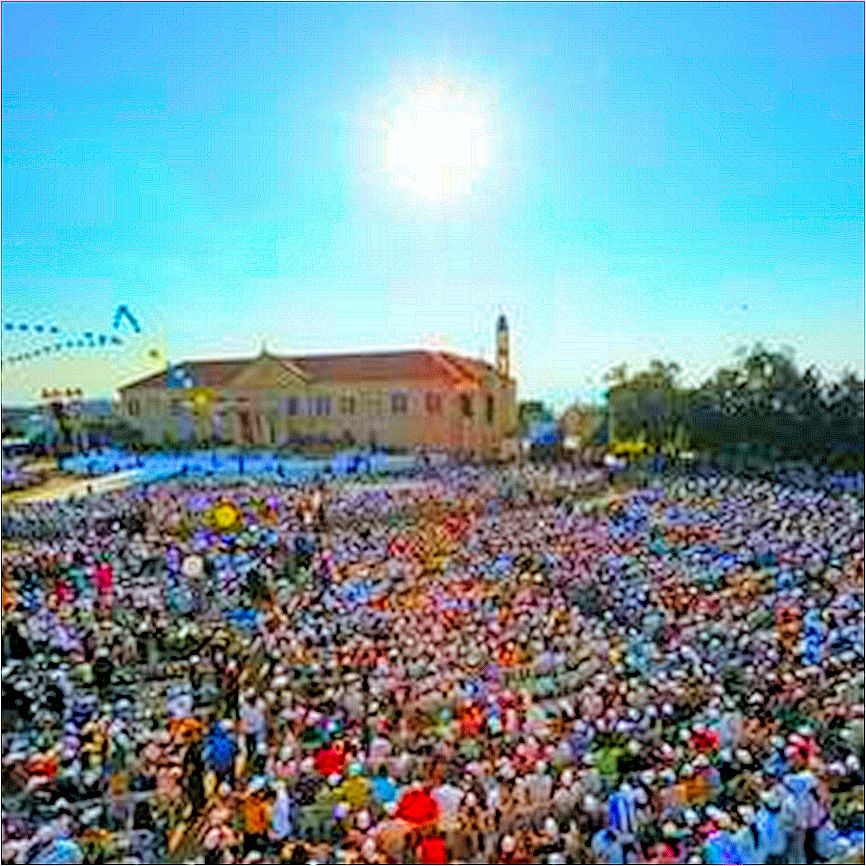
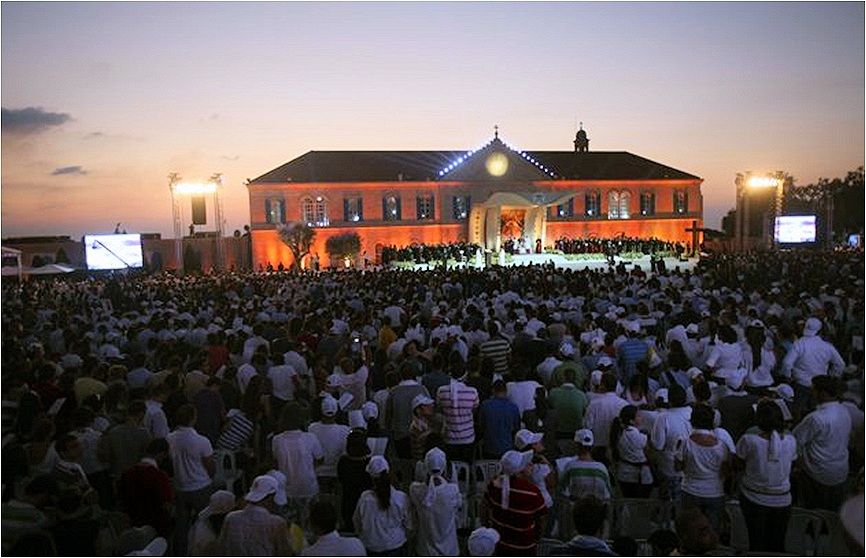 Afternoon and evening views of the youth meeting.
Pope speaks to the youth
Afternoon and evening views of the youth meeting.
Pope speaks to the youth
about Christian exodus
By JOHN L. ALLEN JR.

BEIRUT, Sept. 15 - In a speech to at least 20,000 Lebanese youth tonight, both Christians and Muslims, Pope Benedict XVI tackled the elephant in the room during his fourth trip to the Middle East: Despite decades of papal appeals, so far nothing has stopped a steep decline in the region’s native Christian population.
[
The Catholic Patriarch of Jerusalem, Foaud Twal, recently warned that the Holy Land is on the brink of becoming a “spiritual Disneyland,” full of glittering spiritual attractions but empty of flesh-and-blood Christians. Many observers wonder if a similar fate awaits the entire region.
Tonight, Benedict addressed those concerns, almost pleading with Lebanon's Christian youth not to taste the “bitter sweetness” of emigration.
“I am aware of the difficulties which you face daily on account of instability and lack of security, your difficulties in finding employment and your sense of being alone and on the margins,” the pope said.
But those frustrations, he said, should not prompt them to choose “an uprooting and a separation for the sake of an uncertain future.”
“You are meant to be protagonists of your country’s future, and to take your place in society and in the Church,” he said, speaking in French as he has throughout the trip.
Popes and other Church leaders have issued similar calls many times, but to date they’ve had little appreciable impact in arresting the demographic decline, which some experts call a “Christian exodus.”
According to statistics provided during the Vatican’s 2010 Synod of Bishops on the Middle East, roughly 20 percent of the region was made up of Christians in the early 20th century, while today the Christian share stands at 5 percent. According to one projection, its native Arab Christian population could be cut in half again by 2020.
The Middle East is generally defined [in terms of Church jurisdiction], as consisting of seventeen states and territories: Saudi Arabia, Bahrain, Cyprus, Egypt, United Arab Emirates, Jordan, Iran, Iraq, Israel, Kuwait, Lebanon, Oman, Qatar, Syria, Turkey, Palestinian Territories, and Yemen.
According to statistics given during the Vatican’s 2010 Synod of Bishops on the Middle East, there are 20 million Christians in the region, of whom 12 million are natives and roughly eight million are recent arrivals, mostly foreign “guest workers.”
To be sure, alongside the exodus is a boom in new Christians. Saudi Arabia alone is now home to what the Vatican believes to be 1.25 million Catholics, mostly foreign nationals from places such as the Philippines and India, working in domestic services and the oil industry. Others, however, are Westerners employed in high-end occupations.
Even the well-heeled Westerners often face serious restrictions on their ability to practice Christianity openly. One recently described the situation as living in a “gilded catacomb.”
The threats facing Arab Christians are, if anything, even more serious and, to some, seemingly intractable. They include:
- General political and economic stagnation
- Insecurity about the future, especially in the wake of the Arab Spring
- An endemic sense of second class citizenship, which is linked to Islamic fundamentalism in many places, and aggravated by Israeli security policies in the Holy Land
- In some cases, explicit anti-Christian persecution
Many of those conditions afflict the general population too, but Christians are often better positioned to leave – in part because they’re sometimes more educated and prosperous, thanks largely to the church's extensive school system in the region, and in part because they have access to networks of support in the West.
In Iraq, the country’s estimated 1.5 million Christians prior to the First Gulf War in 1991 have been reduced to perhaps 400,000 today, and many observers believe similarly dramatic declines may be in store both in Egypt and in Syria.
Benedict XVI heard plaintive references to these dynamics tonight, despite the fact that Christians remain a strong presence in Lebanon, and compared to the rest of the region, the country is presently relatively stable.
Archbishop Georges Bou-Jaoude of Tripoli told the Pope in a brief welcoming address that young people in the country “live in anxiety and fear,” seeing their nation “progressively emptied of its Christian presence.”
Lebanese youth, Bou-Jaoude said, fear rising fundamentalism and the region’s seeming inability “to reconcile itself with modernity.”
Two young people struck similar notes, telling the Pope they watch fellow Christians sell their land and move on, and would like to do something to stop it.
Benedict suggested turning to the great saints of the Church.
“Many of the Apostles and saints lived in troubled times and their faith was the source of their courage and their witness. Find in their example and intercession the inspiration and support that you need,” he said.
The cause of keeping Christians in the Middle East also got a boost from an unexpected source earlier today.
During a meeting between Benedict XVI and leaders of Lebanon’s four major Islamic communities, Mufti Mohammad Rachid Kabbani, a Sunni, told the pope that Muslims “absolutely do not want Christians to leave the Middle East.”
The meeting took place behind closed doors, but a Vatican spokesperson later briefed reporters on its contents.
Tonight Benedict tried to spread Kabbani’s sentiment, asking the Muslims in his crowd “to continue to live unity and harmony with Christians,” calling it a “fine symbiosis.”
“It is vital that the Middle East in general, looking at you, should understand that Muslims and Christians, Islam and Christianity, can live side by side without hatred, with respect for the beliefs of each person, so as to build together a free and humane society,” he said.
Throughout Benedict’s itinerary, Muslim clerics and dignitaries have appeared alongside the Pope, often mixing freely with the Catholic prelates and other Christian leaders who join them in the VIP sections.
Beyond the plea to stay home, Benedict also urged Lebanese youth to pray and celebrate the sacraments, to “fight superficiality and mindless consumption,” to avoid drugs and pornography, and to work to end “abortion, violence, contempt for others, [and] injustice and war.”
Benedict also reached out to Syrian refugees in the crowd, telling them that “the Pope has not forgotten you” and asking Muslims and Christians to come together “to put an end to violence and war” in the country.
The youth rally was held in a large square outside the palace of the patriarch of the Maronite church, the largest of the seven Eastern churches which make up the bulk of Lebanon's Catholic population.
Tomorrow Benedict XVI wraps up his three-day trip to Lebanon with a large open-air Mass on Beirut’s waterfront, followed by an ecumenical meeting hosted by the city’s Syrian Catholic basilica.
[Modificato da TERESA BENEDETTA 17/09/2013 02:13] |
| |
 16/09/2012 13:39 16/09/2012 13:39 |
|
| | | OFFLINE | | Post: 25.502
Post: 7.997 | Registrato il: 28/08/2005
Registrato il: 20/01/2009 | Administratore | Utente Master | |
|
|
| |
 16/09/2012 13:40 16/09/2012 13:40 |
|
| | | OFFLINE | | Post: 25.503
Post: 7.998 | Registrato il: 28/08/2005
Registrato il: 20/01/2009 | Administratore | Utente Master | |
|
 September 16, 24th Sunday in Ordinary Time
September 16, 24th Sunday in Ordinary Time
 ST. CYPRIAN OF CARTHAGE (d Carthage [modern-day Tunis] 258), Bishop, Writer, Martyr, Father of the Church
ST. CYPRIAN OF CARTHAGE (d Carthage [modern-day Tunis] 258), Bishop, Writer, Martyr, Father of the Church
Born to wealthy pagan parents, he was highly educated and a famous orator and teacher. He became a Christian as an adult, receiving his catechesis
from the future St. Caecelius; distributed his wealth to the poor, and vowed himself to chastity before being baptized. He was ordained a priest in 247,
and two years later, he was chosen Bishop of Carthage against his will. Almost immediately, he had to conduct his ministry in hiding after the Decian
persecution began in 250. Many Christians abandoned the Church easily during the persecutions, and their subsequent reinstatement after persecutions
eased, caused great controversies in the third century. Cyprian opposed a rival bishop who simply accepted everyone back without any canonical penance.
He led the opposition, supported by all North African bishops, to Pope Stephen I's decree that on the validity of baptism by heretics if the ritual was
done properly; Cyprian insisted baptism was not valid outside the Church. During a plague in Carthage, he urged Christians to help everyone, including
their enemies and persecutors. He supported Pope St. Cornelius against the anti-Pope Novatian. As a Christian writer (mostly in the form of pastoral
letters) in North Africa, he was considered second only to Tertullian, until Augustine eclipsed them both. During Valerian's persecutions, he was exiled
in 257, then brought back to Carthage where he was sentenced to beheading by sword. He died a martyr as had Pope Stephen I and his successor
Sixtus II in Rome.
Readings for today's Mass:
www.usccb.org/bible/readings/091612.cfm
Final day, Apostolic Visit to Lebanon
Sunday, Sept. 16
BEIRUT
10.00 HOLY MASS
and Handover of the Post-Synodal Apostolic Exhortation
Beirut city center waterfront
- Homily by the Holy Father
- ANGELUS prayers
- Remarks by the Holy Father.
HARISSA
13.20 Lunch with the papal delegation
Apostolic Nunciature
16.50 Farewell from the Nunciature
CHARFET
17.15 ECUMENICAL ENCOUNTER
Salon d'Honneur, Syro-Catholic Patriarchate
BEIRUT
18.30 DEPARTURE CEREMONY
Rafiq Hariri International Airport
- Address by the Holy Father
19.00 Departure for Rome
ROME
21.40 Arrival at Ciampino Airport
Two years ago today...

Benedict XVI began an apostolic visit to the United Kingdom, which was also a state visit. Up to the day
of his arrival, British media were chock-full of the direst predictions about the visit, but starting with
the popular welcome down Edinburgh's High Mile that morning, once again, this greatly 'mis-underestimated'
Pope proved all the Cassandras wrong. The visit, during which he beatified Cardinal John Henry Newman,
was one of the most memorable of his apostolic visits abroad.
[Modificato da TERESA BENEDETTA 16/09/2012 14:58] |
| |
 16/09/2012 14:41 16/09/2012 14:41 |
|
| | | OFFLINE | | Post: 25.504
Post: 7.999 | Registrato il: 28/08/2005
Registrato il: 20/01/2009 | Administratore | Utente Master | |
|
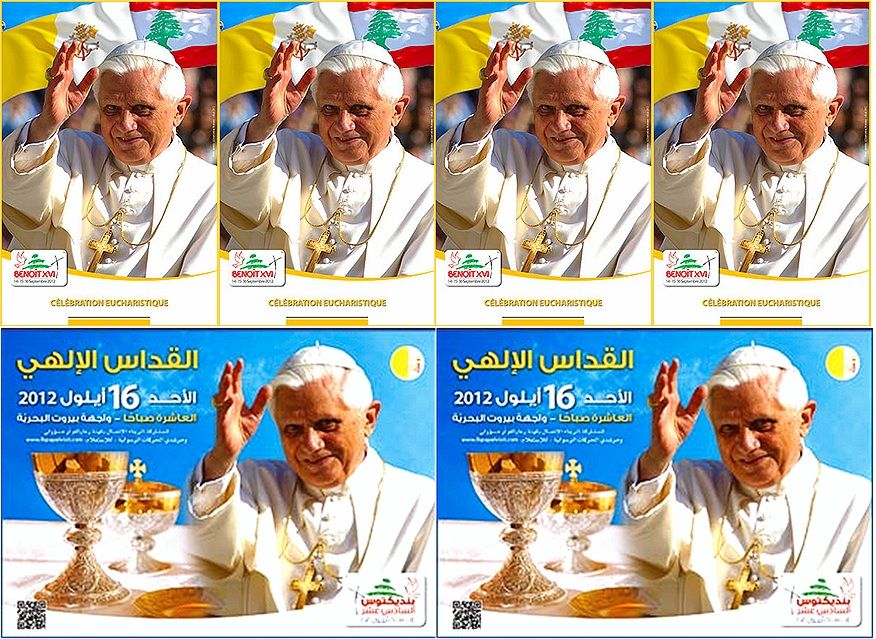 Day 3
Day 3
HOLY MASS, PRESENTATION OF
'ECCLESIA IN MEDIO ORIENTE' AND ANGELUS
Beirut Waterfront
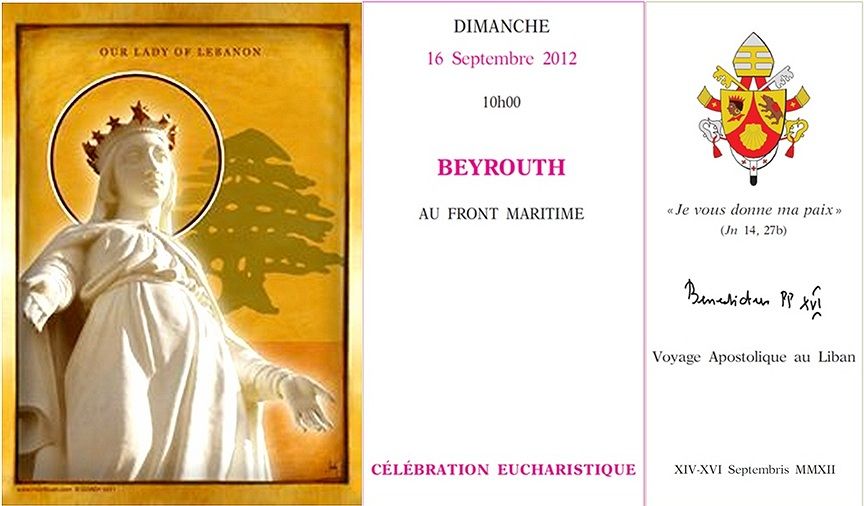
 Pope appeals for peace
Pope appeals for peace
at huge Beirut seafront Mass

Sept. 16, 2012
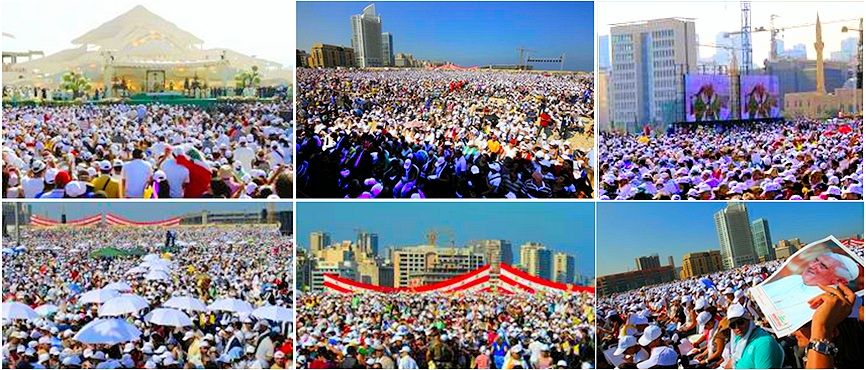
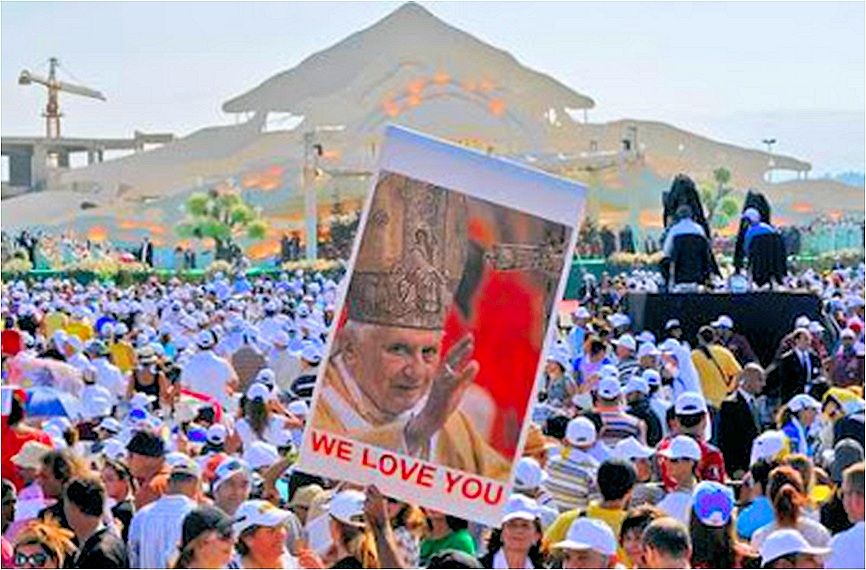
Hundreds of thousands of worshippers attended a seafront Mass in Beirut on the concluding day of Pope Benedict XVI's visit to Lebanon.
The Pope appealed for leaders in the Middle East to work for peace and reconciliation and urged those at the service to "be peacemakers".
He also renewed his call for a end to the violence in neighbouring Syria.
The Pope's visit has also coincided with anti-US protests across the region over a film deemed insulting to Islam.
It is the first papal trip to Lebanon since John Paul II went there in 1997.
An estimated 350,000 worshippers gathered for the waterfront Mass. [Organizers had expected a maximum 75,000.]They waved flags and cheered as the Pope made his way through the crowd in his bullet-proof popemobile.
During the service, he urged Christians throughout the Middle East to do their part to end "the grim trail of death and destruction" in the region.
Calling again for peace in Syria, he said: "I appeal to the Arab countries, that, as brothers, they might propose workable solutions respecting the dignity, the rights and the religion of every human person."
Christians from around Lebanon, as well as Syria, Iraq and further afield, travelled to see him speak in what must have been a very thrilling day, the BBC's Jim Muir in Beirut says.
On Saturday the Pontiff met Lebanese political leaders at the presidential palace near Beirut.
Lebanon's politicians are bitterly divided over the conflict in neighbouring Syria, but the Pope met leaders from across the spectrum, including the Shia Muslim movement Hezbollah.
Addressing an audience of government officials, foreign diplomats and religious leaders, he called for the "fundamental right" of religious freedom to be observed.
Earlier in his visit, the Pope condemned religious fundamentalism and called on all religious leaders in the Middle East "to do everything possible to uproot this threat".
Controversy over a film deemed to be offensive to the Prophet Mohammed has provoked protests throughout the region since the Pope's arrival in Lebanon.
The film, Innocence of Muslims, is believed to have been made by a Coptic Christian in the US, and related unrest has led to the death of, among others, the US ambassador to Libya.
The Pope also addressed a gathering of thousands of young people on Saturday, and urged them to stay in Lebanon "and take your place in society and in the Church".
The number of Christians in the region has been greatly reduced in recent years due to political upheaval and economic pressures.
Pope decries Syria ‘horror’
at open-air Mass in Beirut

BEIRUT, Sept. 16 (AP) - — Pope Benedict XVI made a sweeping appeal Sunday for peace in Syria and the Middle East, decrying the violence “which generates so much suffering.”
Speaking at an open-air Mass before a huge crowd, he urged the international community and Arab countries in particular to find a solution to end the conflict in neighboring Syria.
“Why so much horror? Why so many dead,” Benedict said, lamenting that “the first victims are women and children.”
With pilgrims from across the Middle East in the crowd he said Christians must do their part to end the “grim trail of death and destruction” in the region.
“I appeal to you all to be peacemakers,” Benedict said.
Benedict spoke from an altar built on land reclaimed with debris from Lebanon’s 1975-1990 civil war, pressing ahead with his call for peace and reconciliation between Christians and Muslims.
The Rev. Federico Lombardi, a Vatican spokesman, said local organizers put the crowd at some 350,000 people.
Benedict said that justice and peace are needed in building “a fraternal society, for building fellowship.”
The 85-year pope, wearing green vestments, appeared to be holding up well in the Mediterranean heat.
Helicopters flew overhead and soldiers set up roadblocks and patrolled streets in downtown Beirut.
The crowd cheered and waved tiny Vatican and Lebanese flags as Benedict arrived in his bullet-proof popemobile at the Mass site on the Beirut waterfront.
Benedict has been appealing for tolerance and religious freedom.
The papal visit comes amid soaring sectarian tensions in the region, exacerbated by the conflict in Syria, which is in the throes of an 18-month-old civil war. At a meeting with young people Saturday evening, the Pope said he admired the courage of Syrian youth and that he did not forget their suffering.
Representatives from Lebanon’s many mostly religious groups attended.
Patriarch Bechara al-Rai, head of the Maronite Catholic Church, told the pope shortly before the Mass started, “Your visit is a safety valve at a time when Christians feel the instability and are faithfully resisting to confirm they are deep-rooted in this land despite the major challenges.”
Many Christians in the Middle East are uneasy at the Arab Spring, which has led to the strengthening of Islamist groups in most countries that have experienced uprisings.
Nawaf al-Moussawi, a representative of the Shiite Islamist militant group Hezbollah who attended the Mass, told Lebanon’s leading LBC TV: “Our message is that we want to work together for a Middle East and a region where religions and sects live on the basis of justice that lead to peace.
“What we complain about in the region today is that we are suffering from the injustice of colonial policies,” al-Moussawi added in an apparent reference to U.S. policies. “We only see its fleets.” Hezbollah is allied with Syria, which blames an alleged Western and Arab conspiracy for its woes.
The U.S. considers Hezbollah a terrorist organization. Spokesman Lombardi declined to say what the Vatican’s position is on the group.
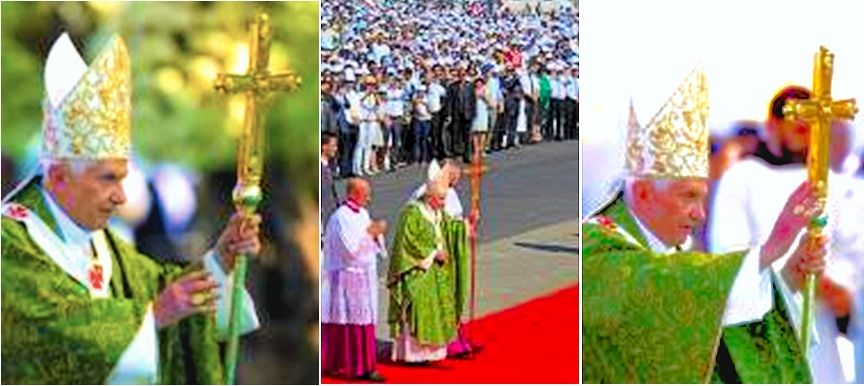
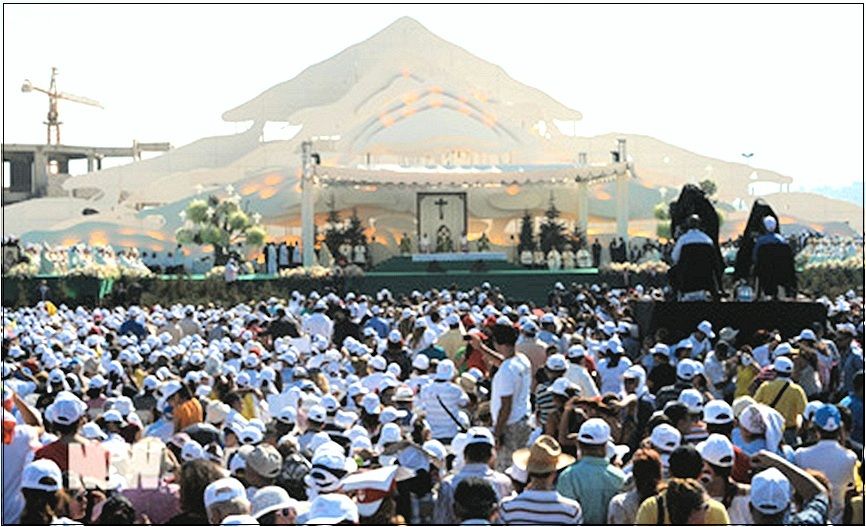
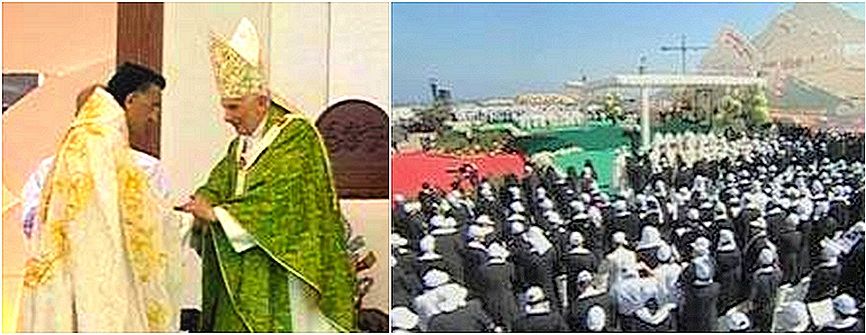
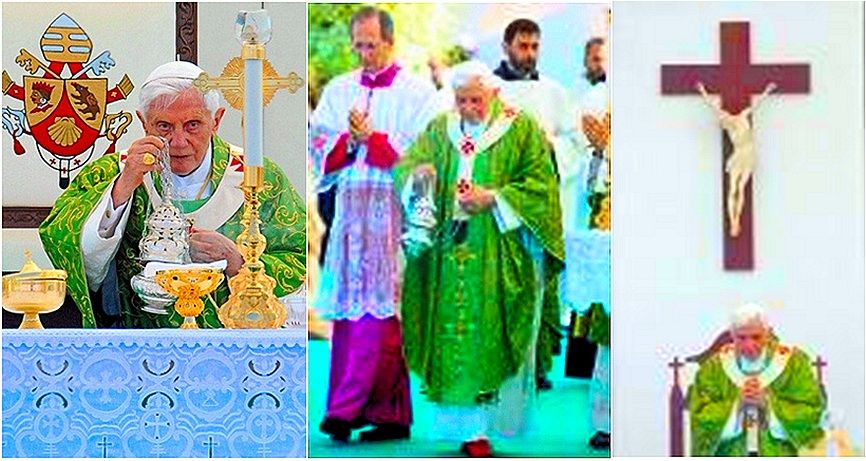
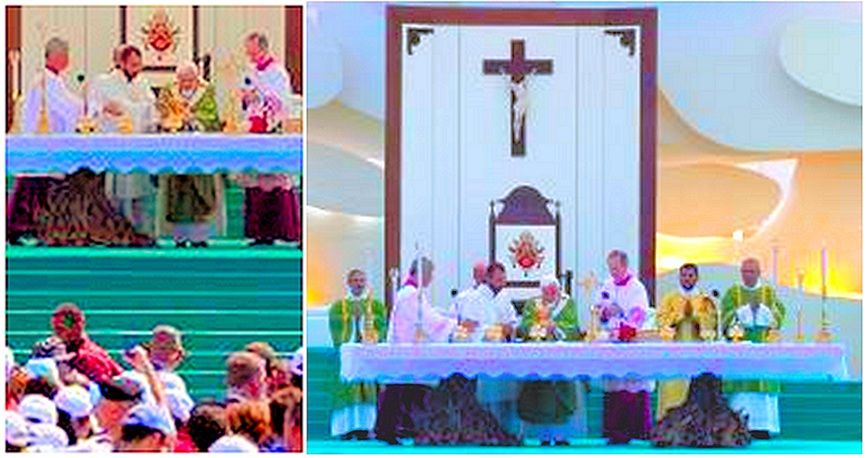
Here is the official English translation of the Pope's homily:
Dear Brothers and Sisters,
“Blessed be God, the Father of our Lord Jesus Christ!” (Eph 1:3).
Blessed be God on this day when I have the joy of being here with you, in Lebanon, to consign to the Bishops of the region my Post-Synodal Apostolic Exhortation Ecclesia in Medio Oriente!
I offer heartfelt thanks to His Beatitude Bechara Boutros Raï for his kind words of welcome. I greet the other Patriarchs and Bishops of the Eastern Churches, the Latin Bishops of the neighbouring regions, and the Cardinals and Bishops who have come from other countries.
I greet all of you with great affection, dear brothers and sisters from Lebanon and from throughout this beloved region of the Middle East, as you join with the Successor of Peter in celebrating Jesus Christ crucified, dead and risen.
My respectful greeting goes also to the President of the Republic, to the Lebanese authorities, and to the leaders and followers of the other religious traditions who have elected to be present this morning.
On this Sunday when the Gospel asks us about the true identity of Jesus, we find ourselves transported with the disciples to the road leading to the villages around Caesarea Philippi. Jesus asks them: “Who do you say that I am?” (Mk 8:29).
The moment he chose to ask this question is not insignificant. Jesus was facing a decisive turning-point in his life. He was going up to Jerusalem, to the place where the central events of our salvation would take place: his crucifixion and resurrection. In Jerusalem too, following these events, the Church would be born.
And at this decisive moment, Jesus first asks his disciples: “Who do men say that I am?” (Mk 8:27). They give very different answers: John the Baptist, Elijah, one of the prophets!
Today, as down the centuries, those who encounter Jesus along their own way give their own answers. These are approaches which can be helpful in finding the way to truth. But while not necessarily false, they remain insufficient, for they do not go to the heart of who Jesus is. Only those willing to follow him on his path, to live in fellowship with him in the community of his disciples, can truly know who he is.
Finally, Peter, who had dwelt with Jesus for some time, gives his answer: “You are the Christ” (Mk 8:29). It is the right answer, of course, but it is still not enough, since Jesus feels the need to clarify it.
He realizes that people could use this answer to advance agendas which are not his, to raise false temporal hopes in his regard. He does not let himself be confined to the attributes of the human saviour which many were expecting.
By telling his disciples that he must suffer and be put to death, and then rise again, Jesus wants to make them understand his true identity. He is a Messiah who suffers, a Messiah who serves, and not some triumphant political saviour. He is the Servant who obeys his Father’s will, even to giving up his life. This had already been foretold by the prophet Isaiah in today’s first reading.
Jesus thus contradicts the expectations of many. What he says is shocking and disturbing. We can understand the reaction of Peter who rebukes him, refusing to accept that his Master should suffer and die! Jesus is stern with Peter; he makes him realize that anyone who would be his disciple must become a servant, just as he became Servant.
Following Jesus means taking up one’s cross and walking in his footsteps, along a difficult path which leads not to earthly power or glory but, if necessary, to self-abandonment, to losing one’s life for Christ and the Gospel in order to save it.
We are assured that this is the way to the resurrection, to true and definitive life with God. Choosing to walk in the footsteps of Jesus Christ, who made himself the Servant of all, requires drawing ever closer to him, attentively listening to his word and drawing from it the inspiration for all that we do.
In promulgating the Year of Faith, which is due to begin next 11 October, I wanted each member of the faithful to renew his or her commitment to undertaking this path of sincere conversion. Throughout this Year, then, I strongly encourage you to reflect more deeply on the faith, to appropriate it ever more consciously and to grow in fidelity to Christ Jesus and his Gospel.
Brothers and sisters, the path on which Jesus wishes to guide us is a path of hope for all. Jesus’s glory was revealed at the very time when, in his humanity, he seemed weakest, particularly through the incarnation and on the cross. This is how God shows his love; he becomes our servant and gives himself to us. Is this not an amazing mystery, one which is at times difficult to accept? The Apostle Peter himself would only come to understand it later.
In today’s second reading, Saint James tells us to what extent our walking in the footsteps of Jesus, if it is to be authentic, demands concrete actions. “I, by my works, will show you my faith” (Jms 2:18).
It is an imperative task of the Church to serve and of Christians to be true servants in the image of Jesus. Service is a foundational element of the identity of Christ’s followers (cf. Jn 13:15-17). The vocation of the Church and of each Christian is to serve others, as the Lord himself did, freely and impartially.
Consequently, in a world where violence constantly leaves behind its grim trail of death and destruction, to serve justice and peace is urgently necessary for building a fraternal society, for building fellowship!
Dear brothers and sisters, I pray in particular that the Lord will grant to this region of the Middle East servants of peace and reconciliation, so that all people can live in peace and with dignity. This is an essential testimony which Christians must render here, in cooperation with all people of good will. I appeal to all of you to be peacemakers, wherever you find yourselves.
Service must also be at the heart of the life of the Christian community itself. Every ministry, every position of responsibility in the Church, is first and foremost a service to God and to our brothers and sisters. This is the spirit which should guide the baptized among themselves, and find particular expression in an effective commitment to serving the poor, the outcast and the suffering, so that the inalienable dignity of each person may be safeguarded.
Dear brothers and sisters who are suffering physically or spiritually, your sufferings are not in vain! Christ the Servant wished to be close to the suffering. He is always close to you. Along your own path, may you always find brothers and sisters who are concrete signs of his loving presence which will never forsake you! Remain ever hopeful because of Christ!
And may all of you, my brothers and sisters who have come to take part in this celebration, strive to be ever more fully conformed to the Lord Jesus, who became the Servant of all for the life of the world. May God bless Lebanon; may he bless all the peoples of this beloved region of the Middle East, and may he grant them the gift of his peace. Amen.
At the end of the Mass, before the Angelus, the Holy Faher formally consigned his Apostolic Exhortation to the Patriarchs and Bishops of the Middle East:
Your Beatitudes, Your Eminences,
Dear Brother Bishops and Priests,
Dear Brothers and Sisters in Christ,
The liturgical celebration in which we have just taken part was an opportunity to thank the Lord for the gift of the Special Assembly for the Middle East of the Synod of Bishops, held in October 2010 on the theme: The Catholic Church in the Middle East: Communion and Witness. “Now the company of those who believed were of one heart and soul” (Acts 4:32).
I would like to thank all the Synod Fathers for their contribution. My gratitude also goes to the Secretary-General of the Synod of Bishops, Archbishop Eterović, for the work achieved and for his words on your behalf.
Having signed the post-Synodal Apostolic Exhortation Ecclesia in Medio Oriente, I am pleased now to present it to all the local churches through you, the Patriarchs and Bishops, both Eastern and Latin, of the Middle East.
With the consigning of this document there now begins its study and appropriation by all the members of the Church, pastors, consecrated persons and lay people, so that everyone will find new joy in the pursuit of his or her mission, encouraged and fortified to put into action the message of communion and witness understood in the various human, doctrinal, ecclesiological, spiritual and pastoral aspects of this Exhortation.
Dear brothers and sisters of Lebanon and the Middle East, I hope that this Exhortation will be a guide to follow the various and complex paths where Christ goes before you.
May communion in faith, hope and charity be strengthened in your countries and in every community so as to make credible your witness to the Triune God, who has drawn close to each one of us.
Dear Church in the Middle East, draw from the source of salvation which became a reality in this unique and beloved land! Follow in the footsteps of your fathers in faith, who by tenacity and fidelity opened up the way for humanity to respond to the revelation of God!
Among the wonderful diversity of saints who flourished in your land, look for examples and intercessors who will inspire your response to the Lord's call to walk towards the heavenly Jerusalem, where God will wipe away every one of our tears (cf. Rev 21:4)!
May fraternal communion be a support for you in your daily life and the sign of the universal brotherhood which Jesus, the firstborn of many, came to bring! Thus, in this region which saw his actions and heard his words, may the Gospel continue to resonate as it did 2,000 years ago, and may it be lived today and for ever! Thank you.
Finally, his message before leading the Angelus:
Dear Brothers and Sisters,
Let us turn now to Mary, Mother of God, Our Lady of Lebanon. Let us ask her to intercede with her divine Son for you and, more particularly, for the people of Syria and the neighbouring countries, imploring the gift of peace.
You know all too well the tragedy of the conflicts and the violence which generates so much suffering. Sadly, the din of weapons continues to make itself heard, along with the cry of the widow and the orphan. Violence and hatred invade people’s lives, and the first victims are women and children.
Why so much horror? Why so many dead? I appeal to the international community! I appeal to the Arab countries that, as brothers, they might propose workable solutions respecting the dignity, the rights and the religion of every human person!
Those who wish to build peace must cease to see in the other an evil to be eliminated. It is not easy to see in the other a person to be respected and loved, and yet this is necessary if peace is to be built, if fraternity is desired (cf. 1 Jn 2:10-11; 1 Pet 3:8-12).
May God grant to your country, to Syria and to the Middle East the gift of peaceful hearts, the silencing of weapons and the cessation of all violence! May men understand that they are all brothers!
Mary, our Mother, understands our concern and our needs. Together with the Patriarchs and Bishops present, I place the Middle East under her maternal protection (cf. Propositio 44).
May we, with God’s help, be converted so as to work ardently to establish the peace that is necessary for harmonious coexistence among brothers, whatever their origins and religious convictions.
We now pray: Angelus Domini nuntiavit Mariae… etc.
Without Daylife, it's become even more problematic - tedious and really rtime-consuming - to find appropriate photographs. Even from the Vatican Radio thumbnails (which provides some Mass photos which do no reproduce very well when enlarged even slightly), I have yet to see photographs of the Holy Faher delviering his homily or consigning the Exhortation to the Patriarchs and Bishops. And yet the Mass and the consigning of the document were the focal points of this event. It would have been appropriate also to have photos of the Pope as he delivered his Angelus message, in which he addresses the Syrian civil war in direct terms.
Needless to say, the most impressive datum of the day was the number of people who came to the Pope's Mass. Organizers expected 75,000, and 350,000 came. That is a colossal number for a Mass in the Middle East, even given that about half of the Lebanese are Christian. By comparison, consider that 250,000 turned up for the Pope's 2007 Mass in Paris, capital of the country that was once called 'the oldest daughter of the Church', and some 280,000, for the Pope's 2010 Mass in Lisbon, capital of what was once one of the staunchest of Catholic nations. Lebanon has a fraction of the population of either France or Portugal. (We can't compare with the attendance in New York, and Washington, where the papal Masses were held in baseball stadia with a fixed capacity of 50,000-70,000. I suppose one might measure the UK's secularity by the fairly low draw of 70,000 in Glasgow and the 120,000 in Birmingham for the Newman beatification Mass, since in both cases, the venue was open parkland.)
The Mass, of course, was beautiful as it always with the the Pope, but most of the music was excellent. The Gloria had a setting that started out truly gloriously, with wonderful polyphony in parts, even if the soloist did not particularly shine, and the Responsorial PSalm was intoned beautifully by a cantor in Arabic fashion.
One must be grateful to the Lebanese, for what seemed to be total involvement in the Pope's visit. The sight of Muslim schoolgirls lining the Pope's route, some even holding up a poster of the Pope, was quite special.
And whatever may be said about the rivalry and disunity among the various Oriental Catholic Churches in Lebanon, the visit was a good opportunity for the rest of the Catholic Church to know something more about them and their leaders.
John Allen has devoted a long article decrying that the Holy Father never once referred to that 'problem' in all his speeches. But why should he? The program for his visit and all the arrangements were a collaboration among these churches, with the government, for which he was appropriately thankful, and which, to all appearances, was quite a success, because the entire program went off without a hitch. If he had anything to say to hem about this problem, he could say it to them in private - after all, he made it a point to visit each of the four major patriarchal headquarters.
President Sleiman wore his Christianity proudly, attending each of the public papal events - not just at the airport and the presidential palace, where he hosted all those meetings between the Pope and Lebanon's civilian and relgious leaders, but even at the signing of the Exhortation, at the youth rally, and at the Mass this morning.
It was a lovely visit to a lovely country with a seemingly resilient population, and for a few days at least, it did focus world attention on the Pope's appeal for peace in the region, at a time of renewed anti-Western tension in the Muslim world.
Watching the coverage of the youth assembly in Bkerke before the Pope arrived, I could not help thinking of the late Cardinal Martini's words about the Church being old and tired - he did specify Europe, but the Church is not just Europe (and the cardinal seemed to ignore all the young Europeans who have turned up in great and enthiusastic numbers at the WYD celebrations), in contrast to Benedict XVI's ringing declaration at his inaugural Mass that "the Church is young and alive" - which he would reiterate to the assembly in stronger, more stirring terms.
It was poignant to watch the Holy Father walking those long corridors in the Presidential Palace using his walking stick most naturally (think of it as the papal staff without the top), not really leaning on it, but more, I think, to make sure he keeps his balance and that he does have it as an aid if he actually needed it for support. He also seemed to be walking more slowly than he used to. I find that his age affects him most in his speaking - it costs him some effort and you can hear it when he starts to sound hoarse. But he always 'youthens' when he is around young people, as he did last night. [Modificato da TERESA BENEDETTA 17/09/2012 00:41] |
| |
 16/09/2012 22:08 16/09/2012 22:08 |
|
| | | OFFLINE | | Post: 25.505
Post: 8.000 | Registrato il: 28/08/2005
Registrato il: 20/01/2009 | Administratore | Utente Master | |
|
 Day 3
Day 3
Ecumenical Encounter
Syro-Catholic Monastery of Charfet
After the Mass at the Beirut waterfront, the Holy Father returned to the Apostolic Nunciature in Harissa, where he lunched with his delegation from Rome. In the afternoon, after making his farewells at the Nunciature, he had another important appointment before proceeding to the airport for the flight home - a meeting with the non-Catholic leaders of Lebanon.
Here is the official English translation of his address to them:
Your Holiness, Your Beatitude,
Venerable Patriarchs,
Dear Brother Bishops,
Dear Representatives of other Churches and Protestant Communities,
Brothers and Sisters,
It is with great joy that I meet with you, in this monastery of Our Lady of Deliverance of Charfet, a place of great importance for the Syrian Catholic Church in Lebanon and the entire Middle East.
I thank His Beatitude Ignace Youssef Younan, Syrian Catholic Patriarch of Antioch, for his warm words of welcome.
I fraternally greet each one of you, who represent the diversity of the Church in the East, and in particular His Beatitude Ignace IV Hazim, Greek Orthodox Patriarch of Antioch and all the East and His Holiness Mar Ignatius I Zakke Iwas, Patriarch of the Syrian Orthodox Church of Antioch and all the East.
Your presence brings great solemnity to this meeting. I thank you with all my heart for being here with us. My thoughts also go to the Coptic Orthodox Church of Egypt and to the Ethiopian Orthodox who have had the recent sadness of losing their respective Patriarchs. I wish to assure them of my fraternal closeness and of my prayers.
Allow me to acknowledge here the testimony of faith shown by the Syrian Antiochene Church in the course of its glorious history, a testimony to an ardent love for Christ, which has caused it to write some heroic pages of this history, right up to the present, by remaining committed to the faith even to the point of martyrdom.
I encourage this Church to be for the peoples of the region a sign of the peace that comes from God as well as a light that keeps their hope alive. I extend this encouragement to all the Churches and ecclesial communities present in the region.
Dear brothers, our encounter this evening is an eloquent sign of our profound desire to respond to the call of Christ, “that all may be one” (Jn 17:21).
In these unstable times, so inclined to the violence which your region knows so well, it is even more necessary that Christ’s disciples give an authentic witness to their unity, so that the world may believe in their message of love, peace and reconciliation. This is a message that all Christians, and we in particular, have been commissioned to hand on to the world, a message of inestimable value in the present context of the Middle East.
Let us work without ceasing so that the love of Christ may lead us little by little into full communion with each other. In this regard, by means of common prayer and mutual commitment, we must constantly return to our one Lord and Saviour. For, as I wrote in the Apostolic Exhortation Ecclesia in Medio Oriente which I have the pleasure of consigning to you, “Jesus draws into unity those who believe in and love him; he gives them the Spirit of his Father as well as Mary, his mother” (n. 15).
I entrust each one of you and all the members of your Churches and ecclesial communities to the Virgin Mary. May she intercede with her Son for us, so that we may be delivered from every evil and from all forms of violence, and so that the Middle East may at last know a time of reconciliation and peace.
May the words of Jesus that I have so often cited during this journey, سَلامي أُعطيكُم - My peace I give to you! (Jn 14, 27), be for all of us the common sign that we will give in the name of Christ to the peoples of this beloved region, which longs to see those words fulfilled! Thank you!
[Modificato da TERESA BENEDETTA 16/09/2012 22:56] |
| |
 16/09/2012 22:56 16/09/2012 22:56 |
|
| | | OFFLINE | | Post: 25.506
Post: 8.001 | Registrato il: 28/08/2005
Registrato il: 20/01/2009 | Administratore | Utente Master | |
|
 Day 3
Day 3
Departure Ceremony
Hariri International Airport, Beirut
Pope Benedict XVI ended his apostolic visit to Lebanon Sunday evening with a departure address that expressed everything that was special about this visit that has been so auspicious in the most inauspicious of times.
Here is the official translation of the address, delivered to the President of Lebanon and other govenrment officials, and the Patriarchs of the Oriental Churches based in Beirut:
Mr President,
Messrs President of the Parliament and of the Council of Ministers,
Your Beatitudes, my brother Bishops,
Civil and religious authorities, dear Friends,
As the moment to depart draws near, I leave Lebanon with regret. I thank you for your words, Mr President, and for promoting along with the Government whose representatives I salute, the organization of the various events during my stay with you, assisted in a special way by the efficiency of the various services of the Republic and the private sector.
I thank, too, Patriarch Bechara Boutros Raï, and all the Patriarchs present, as well as the Eastern and Latin Bishops, priests, deacons, men and women religious, seminarians and faithful who came to receive me.
In visiting you, it was as if Peter himself had come to you and you received him with the cordiality which characterizes your Churches and your culture.
My special thanks go to the entire Lebanese people who form a beautiful and rich mosaic and who have shown the Successor of Peter their enthusiasm by the efforts, both general and specific, of each community. I cordially thank our venerable sister Churches and the Protestant communities.
I thank in particular representatives of the Muslim communities. Through my stay here, I have noticed how much your presence has contributed to the success of my journey. In these troubled times, the Arab world and indeed the entire world will have seen Christians and Muslims united in celebrating peace.
It is a tradition in the Middle East to receive a guest with consideration and respect as you have done. I thank you all. But, to that consideration and respect, you added something else, which can be compared to one of those renowned oriental spices which enriches the taste of food: your warmth and your affection, which make me wish to return. I thank you for that especially. May God bless you for it!
During my all too brief stay, motivated principally by the signature and consigning of the Apostolic Exhortation Ecclesia in Medio Oriente, I have been able to meet various elements of your society.
There were moments that were more official in character, others that were more intimate, moments of great religious importance and of fervent prayer, and others marked by the enthusiasm of young people. I give thanks to God for granting these occasions, for these meaningful encounters which I was able to have, and for the prayer offered by all and for all in Lebanon and the Middle East, whatever their origins or religious beliefs.
In his wisdom, Solomon asked Hiram of Tyre to build a house for the name of God, a sanctuary for all eternity (cf. Sir 47:13). And Hiram, whom I mentioned at my arrival, sent wood taken from the cedars of Lebanon (cf. 1 Kg 5:22). Cedar furnishings adorned the interior of the Temple, with garlands of sculpted flowers (cf. 1 Kg 6:18). Lebanon was present in the sanctuary of God.
May the Lebanon of today, and her inhabitants, also dwell in the sanctuary of God! May Lebanon continue to be a place where men and women can live in harmony and peace with each other, in order to give the world not only a witness to the presence of God, the primary theme of this past Synod, but also a witness to the communion between people, the second theme of the Synod, whatever their political, social, or religious standpoint.
I pray to God for Lebanon, that she may live in peace and courageously resist all that could destroy or undermine that peace. I hope that Lebanon will continue to permit the plurality of religious traditions and not listen to the voices of those who wish to prevent it.
I hope that Lebanon will fortify the communion among all her inhabitants, whatever their community or religion, that she will resolutely reject all that could lead to disunity, and with determination choose brotherhood. These are blossoms pleasing to God, virtues that are possible and that merit consolidation by becoming more deeply rooted.
The Virgin Mary, venerated with devotion and tenderness by the faithful of the religious confessions here present, is a sure model for going forward in hope along the path of a lived and authentic brotherhood.
Lebanon understood this well when, some time ago, she proclaimed 25 March as a holiday, thus allowing everyone to live more deeply their unity in serenity. May the Virgin Mary, whose ancient shrines are so numerous in your country, continue to accompany and inspire you!
May God bless Lebanon and all the Lebanese! May he never cease to draw them to himself so as to offer them a share in his eternal life! May he fill them with his joy, his peace and his light! May God bless all the Middle East!
Upon all of you, I affectionately invoke abundant divine blessings. لِيُبَارِك الربُّ جميعَكُم – God bless you all!
The first and final words, and the theme of this visit:
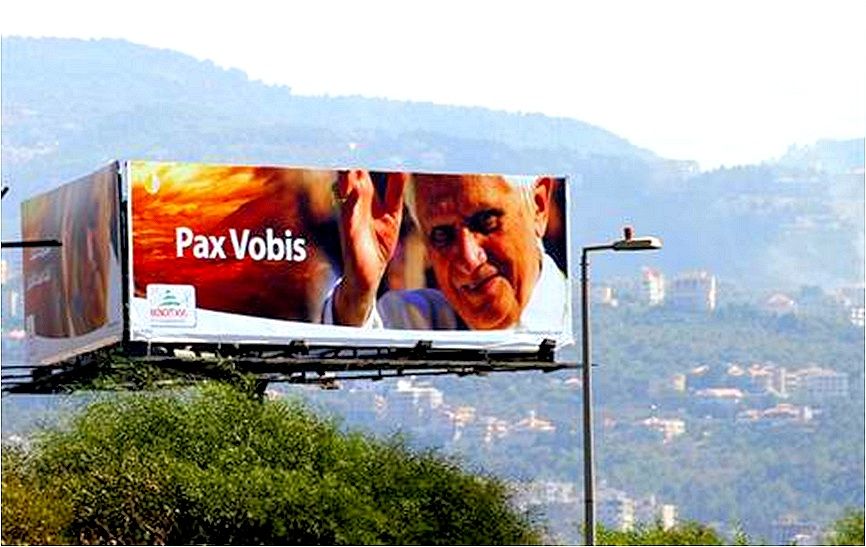 1
I hope they leave this billboard on the mountainside!
 DEO GRATIAS once again for a perfect apostolic visit and for the gift of Benedict XVI himself, who grows infinitely dearer everyday as he grows in the grace of God. May God and all his saints and angels continue to watch over him and keep him safe, well and ever joyous.
DEO GRATIAS once again for a perfect apostolic visit and for the gift of Benedict XVI himself, who grows infinitely dearer everyday as he grows in the grace of God. May God and all his saints and angels continue to watch over him and keep him safe, well and ever joyous.
 BTW, I've stopped fretting about pictures. If they are posted online, I'll find, collate, and post them, not as promptly as I would prefer, but at least to keep a complete, if not comprehensive, photo record of papal events..
BTW, I've stopped fretting about pictures. If they are posted online, I'll find, collate, and post them, not as promptly as I would prefer, but at least to keep a complete, if not comprehensive, photo record of papal events..
[Modificato da TERESA BENEDETTA 16/09/2012 23:05] |
| |
 16/09/2012 23:27 16/09/2012 23:27 |
|
| | | OFFLINE | | Post: 25.507
Post: 8.001 | Registrato il: 28/08/2005
Registrato il: 20/01/2009 | Administratore | Utente Master | |
|
 How did the trip go?
How did the trip go?
Fr. Lombardi is obviously happy,
having been worried earlier!

Sept. 16, 2012
Vatican Press Office director Fr. Federico Lombardi, SJ, assessed the papal visit in an interview with Vatican Radio's Tracey McClure before leaving Lebanon.
As the Holy Father prepares to leave Lebanon Sunday, could you give us your impressions of the trip?
My impression is obviously very positive, especially if I compare it with the attitude with which I came. I was worried: Will the Pope succeed in giving his message? Will people listen to him? Now we have positive answers to all these questions.
What we have seen here in Beirut, in Lebanon, was a wonderful encounter between the Pope and the Lebanese, different parts of this complex society, Catholics of different rites, but also Muslims of different communities.
The presence of the President of the Republic at all public moments of this trip, was a sign of the participation of the entire land in this historical visit.
I think the Pope was right to come, and with courage, and to say “Yes, I am a pilgrim of peace and my presence will signify that we don’t fear what happens around us, we announce the love of God: peace for all men and women of the world”.
In his Homily on Sunday’s Gospel in which Jesus is on his way to Jerusalem, Pope Benedict said that episode marked a turning point in Jesus’s life. In a certain sense, the Middle East is also marking a turning point today. – What was Pope Benedict inviting Christians here to do?
The Pope has given encouragement, he has confirmed principles we already knew, he has not provided new words or new solutions. But this is not his duty.
He is Peter who encourages us and reinforces the foundations of the Faith for Christians. He has come to confirm all Catholics, all Christians, in their Faith and in their hope – particularly in their hope. That is what he has done.
He has not given specific solutions to specific problems. The document he leaves here, the Post-Synodal Apostolic Exhortation, is an important basis for reflection and discernment for the Christian communities to seek concrete measures and solutions to their pastoral problems. It offers a way for them to engage themselves in the life of society, and so on.
There are many concrete things to do, but these are more the responsibility of the local communities and of the local faithful. The Pope gives directions, and encouragement for all. Work now begins to translate the document into action and into concrete solutions for the many problems.
Sometimes the Church in the Middle East is seen as being somewhat distant from the lay faithful and young people. At the youth gathering Saturday in Bkerke, the young people asked for more help from church leaders to aid them in staying in these lands. How is the Church in Rome cooperating with churches here in that sense?
I think we cannot take responsibility away from those who have responsibility. That is really the local communities, the Catholic communities of the different rites, they have to find a way.
The Pope said yesterday evening to the Patriarchs and the Bishops: please work well on catechesis, that is, on educating young people in the Faith, and adults too, because that’s what they need. The Faith has to be something that engages reason, the heart, the mind, and the entire person. But you have to help people by educating them and catechesis is important.
In this regard, the Pope returned to the theme of the Year of Faith as an occasion to involve the entire community and the Church in this direction. And internationally, we have to seek concrete initiatives of solidarity.
I know many local Churches in Italy too that are engaged in collaborative efforts with local communities in the Holy Land, in Lebanon, and in other parts of the world. It is not a question of centralising the organization of assistance, but it’s a question of concrete solidarity between different local communities in different parts of the world – and it can be very effective because it means more to people than big principles or declarations.
Pope Benedict made an appeal for Syria – one of many times he has called for an end to the violence there. How heavily does this tragic conflict weigh on the Holy Father, and indeed, all of the recent violence we’ve seen across the region?
The conflicts and deaths touch the Holy Father, and everyone else, very profoundly. Sometimes we don’t see a solution, and no one until now has found a solution to the Syrian problem. We try to do what each of us can: sometimes through prayer, sometimes giving advice, and sometimes through appeals.
The Pope has also said we must stop the arms trade and the importation of weapons. He continuously invites people to dialogue because Christians, not only in Syria but throughout the Middle East, are in a position to mediate, in a certain sense, because they are not a power that people fear, they are a minority.
Christians have no influence over weapons and power. In this sense they can invite the different sides in the conflict to come together and dialogue, to understand each other and to reconciliation. This is one of the aspects of the vocation of the Christian communities in the Middle East and this also regards the Christians in Syria.
But we don’t have concrete solutions for all these problems. I also think the Christians who came here from Syria during these days, felt the love of the Pope. His presence has encouraged them in this difficult time.
Speaking at his Angelus on Sunday the Pope called on Arab countries and on the international community to intervene to somehow stop the violence…
This is obvious because we know that conflicts in one country often reflect conflicts elsewhere, among major powers and nations with their specific interests. In this sense, the will of the entire international community to go in the direction of peace will also surely help extinguish tensions in different countries.
The unpredictable Jose Manuel Vidal blows red-hot and unequivocal today in his assessment of he trip - and of the Holy Father:
The miracle of the courageous Pope
by José Manuel Vidal
Translated from

Sept, 16, 2012
Extraordinary. A miracle. A dream come true. The Pope's visit to Lebanon, just as we thought before it began, was a complete success.
He went into the lion's den and came out unharmed and something like a thaumaturge. He came to the edge of hell and was not even singed. The white cassock imprints character and makes miracles.
The frail but valiant Pope - wise, gentle, reserved and sincere - has reaped a new triumph that is pastoral, mediatic, spiritual and even political.
Even at the Vatican, the Pope has shown himself vigorous and has [for now, at least!] silenced those voices which, for their own interests, had been gossiping that he no longer governs, if he ever did; that his reign had begun to give way to the rule of subordinates and the chaos of the various frogs and crows who hatched the mess that was Vatileaks. [That isn't quite how Politi and his ilk put it - they claim he is both unable and uninterested in governing, and the subordinates who are supposed to govern for him are, alas, incompetent.]
To the rest of the world, Benedict XVI has once again presented himself as a global referee, being the great moral authority in a globalized world that has no examples to follow. And in a world without leaders of global weight, the figure of the Pope looms like a giant. [How true! Just as in the death throes of European Communism, John Paul II loomed large alongside political giant Ronald Reagan and his British counterpart, Margaret Thatcher.]
In Lebanon - a miracle of equilibrium between races, languages and religions - the prestige of the Pope has been consolidated. His presence there may have helped damp down the local flames of Muslim rage blamed on a blasphemous video produced by a California man [reportedly an Egyptian Copt, not Israeli as earlier reported, so one more score for the Muslims to settle with Christians. And also, as 'small' as the protest was in the Lebanese Tripoli, it did claim one death.].
In the past three days, Benedict XVI has seemed like a prophet of peace, sent by God, a messenger from heaven to a Middle East incessantly convulsed by wars and assorted violence.
By his very presence, he has animated the Christian minorities, many of them virtually under siege in the Middle East, and filled them with pride. And he called on them to be messengers of peace and servants of reconciliation, of fraternal dialog and of practical ecumenism. To join efforts with no time to spare. To respect Muslims and other religions. To create a united front among all believers [and non-believers of good will!]
The valiant Pope, pride of all Christians, has seduced and gained the hearts of the Muslims in Lebanon. Who has left his imprint in Lebanon - with the cedar he planted as a symbol. And with words directed at neighboring Syria like messenger doves, seeking to help that troubled nation find peace once again.
Andrea Tornielli is equally admiring but less on helium...
The Pope in Lebanon:
Messenger of peace
and fine diplomat
by Andrea Tornielli
Translated from the Italian service of

Sept. 16, 2012
Beyond his post-synodal Apostolic Exhortation - a message of hope for a view of religion that should never be violent - Benedict XVI showed on his trip to Lebanon a capacity to interpret politically the interconnections within the entire Middle Eastern and North African region.
Before his trip, his co-workers insisted on many occasions that the Pope is not a political leader, and a reading of the six major addresses he delivered in Lebanon may give the impression that, because he was arriving at the Middle East powderkeg at a time of maximum tensions, Benedict XVI had chosen to address himself above all to the Christian communities, limiting himself to generic appeals for peaceful coexistence among religions.
But if one looks more closely at his words, especially those he said off the cuff during the in-flight session with reporters, and at Angelus today, one perceives the outline of a precise judgment.
In the interview, the Pope referred to the so-called Arab spring, saying that "the desire for more democracy and more freedom" was positive, with the caveat that "from the history of revolutions, we know that while the demand for freedom that is so important and positive, there is always the danger of forgetting a fundamental aspect of freedom, which is tolerance of the other". [In another of his prolix commentaries during the Lebanon visit, John Allen makes much of the fact that one bishop expressed himself openly suspicious of the 'Arab spring' in front of Benedict, interpreting it as 'correcting the Pope gently'. Did he really expect the Pope to diss the 'Arab spring' directly? That would have been considered by the Muslims to be almost as offensive as they ound the Paleologue quotation in the Regensburg lecture - at a time when the Muslim reaction to the 'blasphemous film' recalls the demos against teh Pope himself because of Regensburg! Besides, his caveat to his 'positive' comment said everything without sounding censorious or negatively critical.]
In the same Q&A, when he was asked about the situation in Syria, Benedict XVI replied that one has to begin by stopping the arms trade, that other nations should stop sending arms to Syria, saying that exporting weapons was 'a grave sin'.
At the Angelus, in praying "specially for the residents of Syria and neighboring countries", he said: "Sadly, the din of weapons continues to make itself heard, along with the cry of the widow and the orphan. Violence and hatred invade people’s lives, and the first victims are women and children. Why so much horror? Why so many dead? I appeal to the international community! I appeal to the Arab countries that, as brothers, they might propose workable solutions respecting the dignity, the rights and the religion of every human person!"
By placing the emphasis on violence, on the horror of war, on the dead, rather than on the need for democracy and freedom that emerged with the 'Arab spring', the Pope expressed the Holy See's realistic approach to the Syrian crisis.
In Tunisia and Egypt, the uprisings led to the rise to power of historic Islamist (extremist) parties that seem to be stabilizing factors for now.
But the situations differ from country to country, and even if it is evident to everyone, including the Vatican, that the downfall of the Assad regime is just a matter of time, Papa Ratzinger was careful not to legitimize or bless the uprising against Assad by resorting to the rhetoric of 'the springtime of the Arab peoples', showing that he has doubts about what could happen with a change of government, or even about the external forces supporting and arming the anti-Assad rebels.
His appeal to the international community to propose 'practical solutions' that can pout an end to the spiral of violence has been the most 'political' message so far from a religious leader whose very presence in a Middle East in flames, spoke before - and perhaps, even more, than his words.
His approach is far from a way of distancing himself from the sufferings and real problems of the Middle Eastern people,s but, quite the contrary, it proves that in analyzing crises, he is not content with simply applying simple slogans to complex situations.
I had not thought about it before, but the Pope's very presence in Lebanon was indeed a message in itself - not just for the Christians of the Middle Eats, and not that he was courageous for entering the gates of hell on earth (he is pragmatic enough to know that the various security agencies involved in guaranteeing his safety while in Lebanon would never given him the green light unless they were absolutely sure that the risks were low and controllable) - but simply because it focused the world, especially the leaders of the region, on his words for a change.
One always assumes that the rest of the world necessarily learns about it when he makes his tireless appeals for peace and an end to hatred and violence in his Angelus messages and his Urbi et Orbi messages. But the news agencies report these appeals in a few short sentences, and although they make these stories available to their subscribers and anyone who searches online, I doubt that the news-briefing officers of national leaders would even bother to include those items in their news summaries, much less highlight them. One must assume that most of the time, such papal appeals do not get to the attention of those persons and institutions they are addressed to.
But his presence in a country - this time, a country that represents the one region on earth that is an ever-boiling cauldron of the worst evils that lead to mass violence and deaths - is of a different order and magnitude altogether. He was genuine Page 1 news, and it focused attention on him and every word that he said, in a way that could not be missed by those concerned.
Besides being the supreme moral authority on earth, Benedict XVI has the advantage of not being suspect politically, because he has no vested interests other than the good of everyone. He is not supporting Assad like Putin, he is not desperately seeking re-election like Obama, he is not playing footsie with Iran like China, he is not desperate to keep trading privileges in the region like France, he has no political ambitions for regional hegemony like Turkey. He is truly both sans peur et sans reproche, the ideal knight to do battle.
[Modificato da TERESA BENEDETTA 17/09/2012 13:09] |
| |
 17/09/2012 14:55 17/09/2012 14:55 |
|
| | | OFFLINE | | Post: 25.508
Post: 8.003 | Registrato il: 28/08/2005
Registrato il: 20/01/2009 | Administratore | Utente Master | |
|
 Monday, Sept. 17, 24th Week in Ordinary Time
Monday, Sept. 17, 24th Week in Ordinary Time
 ST. ROBERTO BELLARMINO [Robert Bellarmine] (Italy, 1542-1621), Jesuit, Cardinal, Doctor of the Church
ST. ROBERTO BELLARMINO [Robert Bellarmine] (Italy, 1542-1621), Jesuit, Cardinal, Doctor of the Church
Benedict XVI dedicated his catechesis on Feb. 23, 2011 to this great Jesuit theologian wjo was one of the great figures of the Counter-Reformation.
www.vatican.va/holy_father/benedict_xvi/audiences/2011/documents/hf_ben-xvi_aud_20110223...
Roberto Bellarmino was born in Montepulciano near Siena, and was ordained in the Jesuit order in 1570. Educated at the Collegio Romano, the University of Padua and the University of Louvain in Belgium, he later taught theology in Louvain and then at the Collegio Romano in the period following the Council of Trent. His most famous work, Controversiae, sought to address the issues raised by Protestant theology from a dispassionate historical and theological perspective, but his most popular work remained his brief catechism of Christian doctrine. He also served as spiritual father to the Jesuit students of the Collegio Romano, including Saint Luigi (Aloysius) Gonzaga. Bellarmine was created a Cardinal by Pope Clement VIII, and made Archbishop of Capua, where he spent three years in preaching and pastoral activity before being recalled to Rome and the service of the Holy See. In his later years, he composed a number of works of spirituality which reflect his deep Ignatian formation, with its stress on meditation on the mysteries of Christ and the loving imitation of the Lord. He is buried in the Jesuit home church of Gesu. He was canonised in 1930 alongside his pupil Luigi Gonzaga. Strangely he was not beatified until 3 centuries after his death: Pius XI beatified him in 1923, canonized him in 1930, and proclaimed him a Doctor of the Church in 1931.
Readings for today's Mass:
www.usccb.org/bible/readings/091712.cfm
AT THE VATICAN TODAY
No events announced for the Holy Father.
The Press office announced the following:
The President of the Tribunal of Vatican City, Prof. Giuseppe Dalla Torre, issued a decree today stating that the first hearing of the trial against Paolo Gabriele and Claudio Sciapelletti will be held on 9:30 a.m, on September 29. The two were indicted by the Investigating Judge last August 13. The trial hearings will be held a the session hall of the Tribunal of Vatican City State. All partiies concerned have been informed.
[Modificato da TERESA BENEDETTA 18/09/2012 01:35] |
| |
 17/09/2012 20:01 17/09/2012 20:01 |
|
| | | OFFLINE | | Post: 25.509
Post: 8.004 | Registrato il: 28/08/2005
Registrato il: 20/01/2009 | Administratore | Utente Master | |
|
 The commentaries are coming in fast and nicely afurious, at least in the Italian media, to the Pope's visit to Lebanon, so I will have to pick only the most interesting and substantial ones to translate.. Here firet is one from Fr. Camisasca, the Superior-General of the Missionaries of San Carlo Borromeo, the priestly arm of Comunione e Liberazione.
Benedict XVI, 'Lion of the Church'
The commentaries are coming in fast and nicely afurious, at least in the Italian media, to the Pope's visit to Lebanon, so I will have to pick only the most interesting and substantial ones to translate.. Here firet is one from Fr. Camisasca, the Superior-General of the Missionaries of San Carlo Borromeo, the priestly arm of Comunione e Liberazione.
Benedict XVI, 'Lion of the Church'
by Massimo Camisasca
Translated from

Sept. 17, 2012
The more time passes with this Pontificate, the more I am convinced of the similarity between Benedict XVI and that great 5th-century Pope and Father of the Church, Leo the Great.
Both Popes have passed and will pass into history for their simple but profound preaching that is able to reveal the permanent quality of the Christian mysteries.
Like Leo the Great, Benedict XVI will pass into history for having sought to put a halt to barbarism. Leo the Great, beyond what did take place historically, did not simply stop with halting Attila at the gates of Rome. He laid down the premises for the positive inclusion of new elements [the positive potential of harnessing barbaric forces?] in the Church's itinerary.
In the same way, Benedict XVI is seeking to stop the forces of evil and to give new energy to the positive factors of history. It is not therefore accidental that he is fighting this battle on two fundamental fronts: by unveiling the true face of God, and by affirming the true task of reason.
First, the true face of God. Against intolerance, Pope Benedict continues to emphasize, since his first encyclical, that God is love, he who seeks out man, who wants to renew him by forgiving him and continually creating communion with him on earth.
His battlecry against fundamentalism, which marked the start as well as the entire course of his just completed visit to Lebanon, is emblematic from this viewpoint.
In the footsteps of St. Augustine, Joseph Ratzinger has fought every attempt to identify faith with politics, and sees all the evil that can come from affirmations today of a God who is invoked for - and thus sought to be identified with - wars, and ultimately, with death.
On the other hand, the Pope is firmly aware that respect for one another's identity is necessary in order to live together peacefully. Nothing could be more contrary to that than a supposed tolerance that would reduce to insignificance the contribution that faith has made to human history.
That is why he says: "When one denies or rejects God, then that is like killing man. When God is excluded from society, not just from the hearts of men, then the premise is laid for hatred, violence, war, destruction. When reason pretends to be the instrument for man's affirmation to be the lord of history against God, the history of the death of mankind begins".
That is also why the Pope proposes Lebanon - a land where coexistence and reciprocal respect are still possible [and largely practised] - as an example for all of the Middle East. An example, however, that both the West as well as the intolerant sectors of Islam have sought to destroy. [I'm not sure how 'the West' has sought to destroy Lebanon - after all, its multicultural, multi-faith society was well-established during its colonial years under France. And it's certainly in the interests of the West today to keep Lebanon's unique pluralism alive.]
All these are reasons why Benedict XVI tirelessly seeks dialog with those communities who are most open to the reasons for living together peacefully and for common edification of society.
Islam occupies a very relevant part of the worldwide political scene, especially after the end of the Cold War. It is capable of offering entire populations the reasons for living and for opposing untimely deaths imposed by wars and violence. It can also offer work and important affective bonds.
But like every human reality, it carries in itself contradictions and wounds. And so we see millions of Muslims disputing the promises of happiness offered by capitalism and seeking a way that is more respectful of man and of the existence of God.
At the same time, however, we see important fringes of the Muslim world that are nonetheless capable of influencing the Muslim majorities in entire nations by preaching violence and unleashing wars and mass assassinations.
The future of the world depends on such a tragic context - within which we must see the preaching and the work of Pope Benedict XVI, for whom the trip to Lebanon was a particularly significant event.
P.S. Fr. Camisasca is not the first commentator to have compared Benedict XVI to Leo the Great. I believe Sandro Magister and Fr. Schall have done so on various occasions. OK, so contemporary Islamist extremism would be the equivalent of Attila the Hun, who, like Islam, was intent on conquering the West and thus dominating the world. It occurred to me to wonder what, in Pope Leo's time, would have been the equivalent of the hostile media and dissident Catholics that are the bane of Benedict's Pontificate. A quick read of the Wikipedia entry on the great Pope shows he did have to deal with the continuing rivaly from Constantinople, with a few outright heresies, which he firmly handled in various ways, and with willful bishops to whom, by then many papal powers had been delegated. And how he dealt with that problem appears to have been his major achievement. (The story with Attila the Hun is apparently more hagiographic than factual - it has not been established exactly what other factors contributed to Attila backing off in 452 after that famous meeting, but he did come back in 455 to sack Rome, though Leo's influence suppressed arson and murders.)
The significance of Leo's pontificate lies in his assertion of the universal jurisdiction of the Roman bishop, as expressed in his letters, and still more in his 96 extant orations. This assertion is commonly referred to as the doctrine of Petrine supremacy.
According to Leo and several Church Fathers, as well as certain interpretations of the Scriptures, the Church is built upon Peter, in pursuance of the promise of Matthew 16:16–19. Peter participates in everything which is Christ's; what the other apostles have in common with him they have through him. What is true of Peter is true also of his successors. Every other bishop is charged with the care of his particular flock, the Roman pontiff with that of the whole Church. Other bishops are his assistants in this great task.
I'd say any dissident in the Church today who thinks the Pope has too much power, or worse, that every bishop has as much power as the Pope, ought to review his history of Leo the Great - and the Gospel, because Christ was unequivocal in handing the keys of the Kingdom to Peter alone!
I can't help note that there still has to be any commentary in the Catholic Anglophone media or the Catholic Anglophone blogosphere about the Lebanon trip, other than John Allen's running commentary while covering the visit - whose last 'analysis' was devoted to faulting Benedict XVI in a most unwarranted way for failing to publicly address the problem of inter-sect rivalry among the major Catholic Eastern Churches based in Lebanon. [Surely, any such internal problems are hardly material for a Pope to discuss in public during an apostolic visit, and surely, he would have addressed any such problems privately with the Church leaders themselves!]... CNS and CNA did cover the trip, thank God, even if it fell on a weekend as the Pope's trips usually do, perhaps because it was a trip to Lebanon, as they did not think it fit to assign any reporter to work the weekend of the Pope's visit to Milan for the World Meeting of Families.
I must interpose the delayed reportage by Giacomo Galeazzi in La Stampa/Vatican Insider of the Papal Mass in Lebanon, which is better than the run-of-the-mill accounts of yesterday's Mass and picks out the highlights from the statements made by the Pope on his third and final day in Lebanon.
Seeking 'practical solutions'
for the Syrian conflict, etc
by Giacomo Galeazzi
Translated from the Italian service of

Sept. 17, 2012
Like Papa Wojtyla during the Cold War, so Benedict XVI stands in the forefront, this time against Islamist escalation. The new 'Church of silence' speaks through him.
"Bring peace to a violent Middle East" - He is entrusting to Christians what seems to be a 'mission impossible'. [Of course, he wasn't placing the entire burden on them, but they have to set the Christian example, against all odds. He has repeatedly called on the international community and the leaders of the region to do what they can as responsible public authorities to seek a workable solution that can lead to 'a lasting stable peace'. That seems to be the more 'impossible' mission, for which neither the Church nor the Pope can offer concrete solutions! Christ did not come as a political Messiah nor did he intend his Church to be.]
Benedict XVI celebrated Mass with 300 patriarchs and bishops on Beirut's waterfront in three languages (Arabic, French and Latin). Seventy-five thousand faithful were expected to attend - 400,000 came [Galeazzi's figure is above the 350,000 given by the Vatican, citing local authorities].
Not content with the mega-screens, the Massgoers sought to get as close as they could to the altar, and many suffered from the day's suffocating heat.
And from the Pope's pulpit, a cry for freedom: "Dignity and rights for all men. They understand they are all brothers under God".
Benedict XVI encouraged the oppressed minorities in the countries with overwhelming Muslim majorities: "Your sufferings are not in vain. Christ is close to those who suffer - he is present beside you and will not abandon you".
Even in the most ephemeral traces, Beirut is the symbol of the contradictions and coexistence of opposites. Not far from the military standing guard for the Mass were the weekend visitors coming to enjoy a swim in the Mediterranean. In the mass media and in the streets, tragic tones and light ones alternate during these days full o new tension.
The Pope, at the Angelus, noted the continuing 'din of weapons' and called on the international community to 'stop the hatred'. From the Arab countries he asked for respect for human dignity and religious freedom because "whoever wants to build peace must stop to see in the other an evil to be eliminated".
It is indispensable, he said, that "everyone can live peacefully and with dignity". This the "essential testimony that Christians must give here, collaborating with all men of good will", Benedict XVI said, echoing words said years ago by John Paul II visiting Lebanon.
To stop the bloodbath in Syria, 'practical solutions' are needed. And so, he turned over to the patriarchs and bishops, and through them, to all Christians in the Middle East, the text of the document that he signed shortly upon arriving in Beirut Friday, which he called "a road map for the future' of Christians in the Middle East.
On Saturday, he gave copies of this Apostolic Exhortation on the Middle East to the civilian and religious leaders he met at the Presidential Palace, including the four leaders of the Sunni, Shiite, Alawite and Druze Muslim communities in Lebanon.
The message is clear: There can be no future without 'the silence of the weapons and the cessation of all violence". And so, it is up to Christians "to draw from the original lifeblood of salvation that was realized in this very land".
"Fraternal communion and the example of the saints" are helpful, he said, speaking on the waterfront which is a landfill area built up with the rubble from the destruction of the 15-year-long civil war in Lebanon which also gave birth to the present institutional system that ensures representation in all the branches of government for all the religious and ethnic groups in the Lebanese population.
"The vocation of the Church and of Christians is to serve, as Jesus did, freely and for all, without distinction", the Pope underscored, decrying what he called today's 'procession of deaths'.
In his farewell address at the airport, he cited Solomon, that man needs to construct "a shrine to God for eternity", whatever one's origin or faith - namely, "a space in which men can live harmoniously, protected from all destructiveness".
P.S. On his blog, Galeazzi has a piece entitled 'Benedict of the Orient', in which he says the Holy Father's example was the model for the final statements made by the Greek Catholic patriarchs who met in Canada last week. I will translate later.
And now, Restan...
Friend of God,
friend to men
Translated from

Sept. 17, 2012
A long line of seasoned men, well on in age, with garments indicating their respective traditions. Each of them came up to the Pope, very close, face to face, to receive from his hands a copy of his Apostolic Exhortation Ecclesia in Medio Oriente.
Benedict XVI takes time for each of them, looks them fraternally in the eye, clasps their hands, and exchanges words with them that will never be reported.
These are the Patriarchs and bishops of some of the most ancient Christian sees who proudly and jealously conserve their respective churches' memory of martyrdom and glory - along with the presidents of the bishops' conferences of other Middle Eastern nations, including Turkey and Iran, nations in which the Christian faith today is as tiny and threatened as the proverbial mustard seed in the Gospel stories.
The Pope was not giving out a guide on how to be Christian in the Middle East and not to die while being so. It is not a strategic plan for a desperate undertaking, but the outlook, full of wisdom and passion, of the pastors themselves of peoples who have been long and sorely tested - an outlook, an embrace and an invitation, all of it urgent: Stay in the land of your fathers, be witnesses for the Crucified One, build together with your compatriots a peace based on justice and reconciliation.
Shortly before this presentation, an apotheosis of songs and waving flags gave way to the fervent depth of the Eucharistic celebration. And once more, as he did twenty centuries ago, Peter spoke. Not the instinctive fisherman who was as prompt to speak a truth he could not comprehend as he was to protest indignantly against the Master's words that he was going to his death.
Today, Peter knows, through the experiences of sorrow and love, that "to decide to follow Jesus is to take his Cross, in order to accompany him on his way, an arduous way, which is not that of power or earthly glory, but which leads necessarily to a renunciation of oneself, to loss one's life for Christ and the Gospel in order to gain it".
The Gospel yesterday says that Jesus explained himself to his own disciples "with all clarity" - the same clarity that Benedict XVI deployed during his 48 hours on Lebanese soil.
The Christians of the Middle East cannot entertain vain illusions. It will not be the Western powers, nor the communications media, nor even the typical astuteness associated with the region, that will assure them o a future. Like Jesus, they can only put their trust in God who called them to this particular mission in company with the universal Church. That Church which only the Pope, with his personal sacrifice, his clarity, and his patent faith, is able to embody these days.
He came to Beirut on the Feast of the Exalttion of the Holy Cross, an inconvenient reminder for many. In the Basilica of St. Paul in Harissa, upon signing the document summarizing the conclusions of the 2010 Synodal Assembly on the Middle East, he expressed aloud the tragedy of our Middle Eastern brothers:
"[Through the Synodal assembly] the entire Church was able to hear the troubled cry and see the desperate faces of many men and women who experience grave human and material difficulties, who live amid powerful tensions in fear and uncertainty, who desire to follow Christ – the One who gives meaning to their existence – yet often find themselves prevented from doing so".
Many were brought to tears upon hearing the Successor of Peter affirm that this is not a time for defeat (so easy to say amid the shortcomings of the world] but the time "to celebrate the victory of love over hatred, of forgiveness over vengeance, of service over domination, of unity over division".
That is the language of the glorious Cross, the Pope underscored, the folly of the Cross "capable of changing our sufferings into a declaration of love for God and mercy for our neighbour; a folly capable of transforming those who suffer because of their faith and identity into vessels of clay ready to be filled to overflowing by divine gifts more precious than gold".
Gathered around the Pope were bishops who had come from hermetic Iran, from remote Armenia, from an uneasy Egypt in transition, from martyred Iraq, from Syria which is being exsanguinated, and from Jerusalem, the mother Church.
Along with them, in respectful silence and with friendly faces, the religious leaders of the Sunni, Shiite, Alawite and Druze Muslims of Lebanon. Old and well-known faces to their Christian neighbors, rarely in comfortable situations, perhaps, but here they were, agreeing with the gentle but firm words of the Bishop of Rome: Build the peace, do not let the poison of violence contaminate your religiosity, unmask the lies of fundamentalism.
To the political leaders and the representatives of Beirut's civilian society, Benedict XVI called strongly for respect of religious freedom. "The freedom to profess and practise one’s religion without danger to life and liberty must be possible to everyone. The loss or attenuation of this freedom deprives the person of his or her sacred right to a spiritually integrated life".
What nowadays passes for tolerance does not eliminate cases of discrimination, and at times it even reinforces them. Without openness to transcendence, which makes it possible to find answers to their deepest questions about the meaning of life and morally upright conduct, men and women become incapable of acting justly and working for peace.
And he notes that mere tolerance is not enough, that it does not eliminate discriminations but even reaffirms them at times. He also warned against the falsity of coexistence based on marginalizing man's religious openness, without which he cannot find answers to his heart's questions about the sense of life and how to live life correctly, and without which he becomes incapable of acting with justice or of committing himself for the sake of peace.
In multi-faith Lebanon, crossroads for centuries between the East and the West, Benedict XVI dwelt on one of his essential themes: Living together, a good life, for all peoples, cannot be sustained either under fundamentalism which is militantly working for Islamic domination, nor under the aggressive secularism which has manifested itself openly in the European democracies.
What is needed is a new understanding and appreciation of religious freedom and its social and political projections - in which, perhaps, Lebanon could prove to be a good laboratory to test it out.
The meeting with youth representatives of Lebanon and the entire Middle East was a cause for special joy to the Pope. The young people were the carnal demonstration of the two central messages in his visit: Christians must not fear the future but involve themselves in building it, and civilian friendship between Christians and Muslims is possible and is a platform on which to build a new type of communal coexistence in the Middle East.
We cannot forget that just as tens of thousands of young Christians and Muslims were applauding the Pope, Islamist-instigated violence was spreading throughout the Middle East. It will require a great educational effort and actual coexistence so that the seed sown by the Pope may germinate, but there is no other way.
Let us return to our opening scene. After the clear papal statements heard in Lebanon, these patriarchs and bishops had to return home - to places where many Christians are tempted to 'castle up' in an effort at some security, rather than to work at coexistence, which may be difficult, or to face the challenge of being actors in the history of these days which have the potential eruptiveness of a volcano.
The people who lined up before the Pope are heirs to a millenary history of heroic witness, of countless sufferings and they bear on their faces and in their spirit the scars of their peoples.
"Fear not, little flock", Benedict XVI enjoined them earlier. But this was not just about sentiments. Peter came to mark out a mission and a pathway. With much to be done: to strengthen unity and the common witness, to abandon attitudes that are merely defensive, to improve the formation of lay faithful [and of the clergy!], to take risks on inter-faith dialog, which is always difficult - but which can also bear much fruit) - with ordinary Muslims, "the Islam of the people", as Cardinal Angelo Scola likes to call them.
Cedars and olives marked the stages of this beautiful visit - the majesty and freshness of a presence which brought much promise to this land, and the oil of welcome, of friendship and of sharing.
Both need to be watered and cared for with wisdom and patience. As Benedict XVI has done without calculations nor reservations. He came as a friend of God and a friend to all men, and everyone ought to have recognized that, in the midst of our daily informational apathy and paralysis, something truly new happened in Lebanon.
Sandro Magister has also popsted his commentary, with its English translation on
chiesa.espresso.repubblica.it/articolo/1350326?eng=y
I will post my translation later, for the record.
A shoutout from Sollers
Meanwhile, an unusual video-tribute on the blog pf Philippe Sollers, the French writer, novelist and critic whose reviews of Benedict XVI's JESUS OF NAZARETH-2 I translated and posted for the Forum, and who is a most unlikely 'fan' of the Pope, of any Pope, having been one of the leaders of the French intellectual movement of the 1960s on the eve of the 1968 counterculture revolution. He is married to atheist philosopher Julia Kristeva, who represented the non-believers at Benedict XVI's Assisi assembly in October last year.
Sollers runs a brief videoclip taken from the Pope's arrival in Beirut and the Mass yesterday with the following message:
Viva Benedict XVI in Beirut! Shame on all murderers, whoever they are!
Courage, old man, as you guide your boat through the unrestrained ocean of human folly!
[Modificato da TERESA BENEDETTA 18/09/2013 01:34] |
| |
 18/09/2012 02:39 18/09/2012 02:39 |
|
| | | OFFLINE | | Post: 25.510
Post: 8.005 | Registrato il: 28/08/2005
Registrato il: 20/01/2009 | Administratore | Utente Master | |
|

 Vatican calls on the UN:
Vatican calls on the UN:
Make Syria’s children a priority

Sept. 17, 2012
Less than 24 hours after Pope Benedict XVI’s heartfelt appeal to regional and global powers to stop the violence in Syria, the Vatican has redoubled its call for urgent aid to the innocent victims of the conflict particularly children.
Addressing the 21st Session of the UN Human Rights Council in Geneva, the Holy See’s permanent observer to the UN , Archbishop Silvano M. Tomasi stated that the international community needs to make humanitarian assistance to all displaced people and other victims of bombardments and indiscriminate destruction, especially to children, a priority.
Archbishop Tomasi echoed the Holy Father’s call for an end to the importation of arms and he appealed to journalists to report on the situation “with fairness and complete information so that public opinion may more easily grasp the futility of violence”.
Below is the full statement of Archbishop Tomasi:
Statement by His Excellency Archbishop Silvano M. Tomasi
Permanent Observer of the Holy See to the United Nations
and Other International Organizations in Geneva
21st Session of the Human Rights Council: Item 4 –
Interactive Dialogue with the Independent International Commission of Inquiry
on the Syrian Arab Republic
Geneva, 17 September 2012
Madam President,
The Report of the Independent International Commission of Inquiry on the Syrian Arab Republic and other sources of information document all too well the results of months of violence in that country:
- Thousands - somw estimate 30,000 - of victims who have lost their lives and many others who have been wounded;
- City neighbourhoods destroyed;
- More than a quarter of a million made refugees;
- 1.2 million internally displaced people;
- Classes cancelled indefinitely for tens of thousands of children.
Above all, social trust and civil conviviality have been broken. This violent conflict shows the futility of war as a means to resolve disagreements.
It is appropriate that this Council should adopt the perspective of the victims in its resolve to promote human rights and to uphold humanitarian law. Respect for the fundamental rights of the victims of this conflict is, in fact, the road that can lead to healing human relations and to peace, an indispensable prerequisite for negotiations and an effective response to the expectations of the people for a democratic new beginning.
The Holy See has been following the worsening of the conflict in Syria with great attention and deep concern given the risk of destabilization in the entire region and the total disregard of civilian population; it has reiterated its rejection of violence from whatever source it may come; and regrets the loss of so many human lives and family tragedies.
The voice of the Holy Father Benedict XVI, a pilgrim of peace in the area, has condemned without any ambiguity the use of violence: “Even though it seems hard to find solutions to the various problems that affect the region,” he said, “we cannot resign ourselves to violence and to the aggravation of tensions. The commitment to dialogue and to reconciliation must be a priority for all the parties concerned and must be supported by the international community.”
A stable peace in the Middle East is an important benefit for the whole world. With God’s gift of peace, local people can use their talents for the development and progress of their countries, enjoy their right to a decent life there, and avoid the misery and suffering of forced uprooting and exile.
Solidarity with the people of Syria and, by extension, to the whole of the Middle East, implies that the international community should put aside selfish interests, support the political process for a cessation of violence and for an orderly and inclusive participation of all groups in the management of the country as citizens of equal dignity and responsibility.
An additional requirement appears urgent to make solidarity effective and genuine: humanitarian assistance to all displaced people and other victims of bombardments and indiscriminate destruction, especially to children.
Then, to the importation of arms, the firm and common will for peace and the importation of ideas for reconciliation should be substituted.
Furthermore, journalists should report on this situation with fairness and complete information so that public opinion may more easily grasp the futility of violence and how in the long run it doesn’t benefit anyone. Media, too, can help build a culture of peace and point at the benefits of reconciliation.
The wave of protests, peaceful on the part of most of the participants, that have characterized what has been called the Arab Spring, stemmed from the deep desire, especially of younger people, for greater freedom, better employment, a real participation in public life. To frustrate these aspirations through the manipulation of power and forms of control will have a lasting damage and miss a historical opportunity for progress.
Madam President, the people of Syria and the Middle East deserve support and solidarity in their moment of need. The promotion of all human rights is an effective and indispensable strategy for the success of their struggle for peace and social conviviality.
Thank you, Madame President.
It is good that the Vatican's observer at the UN should have reiterated the messages given by Benedict XVI in recent days about Syria, in particular, and the unending cycle of violence in the Middle East, on the other, in a formal way to the United Nations - and that included important points from the remarks given by the Pope at his inflight Q&A with journalists en route to Beirut. Every little push is needed (I say little because probably even far less people will get to read Mons. Tomasi's statement compared to the coverage merited and earned by the Pope's statements during his visit to Lebanon), but focusing on the plight of the innocent child victims of the Syrian war is absolutely urgent, and let us pray as much attention is given to them by international charitable organizations as they are giving to the hungry millions in the Horn of Africa. |
| |
 18/09/2012 06:15 18/09/2012 06:15 |
|
| | | OFFLINE | | Post: 25.511
Post: 8.006 | Registrato il: 28/08/2005
Registrato il: 20/01/2009 | Administratore | Utente Master | |
|
 The double issue of L'Osservatore Romano that comes out tomorrow for Sept. 17-18 devotes 6 of its 12 pages to a coverage of the second part of the Holy Father's visit to Lebanon. The trip scheduling was such that it allowed the OR on Saturday, Sept. 15, to report on the Pope's arrival in Beirut. The Sunday issue, Sept. 16, carried the accounts of the signing of the Apostolic Exhortation on Friday afternoon, the visit to the Presidential Palace on Saturday afternoon and the Pope's address to Lebanese political, social, cultural and religious leaders, along with the diplomatic corps. Tomorrow's issue covers the Pope's lunch and address to the bishops of the Middle East and his meeting with young people in Bkerke Saturday evening, the Mass and Angelus on Sunday morning, with the consignment of the Apostolic Exhortation to the patriarchs and bishops of the Middle East, the ecumenical encounter in Charfet before going to the airport, and the departure ceremony. Most of the photos are, unfortunately, in black and white, and poorly resolved.
The double issue of L'Osservatore Romano that comes out tomorrow for Sept. 17-18 devotes 6 of its 12 pages to a coverage of the second part of the Holy Father's visit to Lebanon. The trip scheduling was such that it allowed the OR on Saturday, Sept. 15, to report on the Pope's arrival in Beirut. The Sunday issue, Sept. 16, carried the accounts of the signing of the Apostolic Exhortation on Friday afternoon, the visit to the Presidential Palace on Saturday afternoon and the Pope's address to Lebanese political, social, cultural and religious leaders, along with the diplomatic corps. Tomorrow's issue covers the Pope's lunch and address to the bishops of the Middle East and his meeting with young people in Bkerke Saturday evening, the Mass and Angelus on Sunday morning, with the consignment of the Apostolic Exhortation to the patriarchs and bishops of the Middle East, the ecumenical encounter in Charfet before going to the airport, and the departure ceremony. Most of the photos are, unfortunately, in black and white, and poorly resolved.
Page 1 in tomorrow's issue leads off with the following editorial - and a beautiful photograph of the Pope:
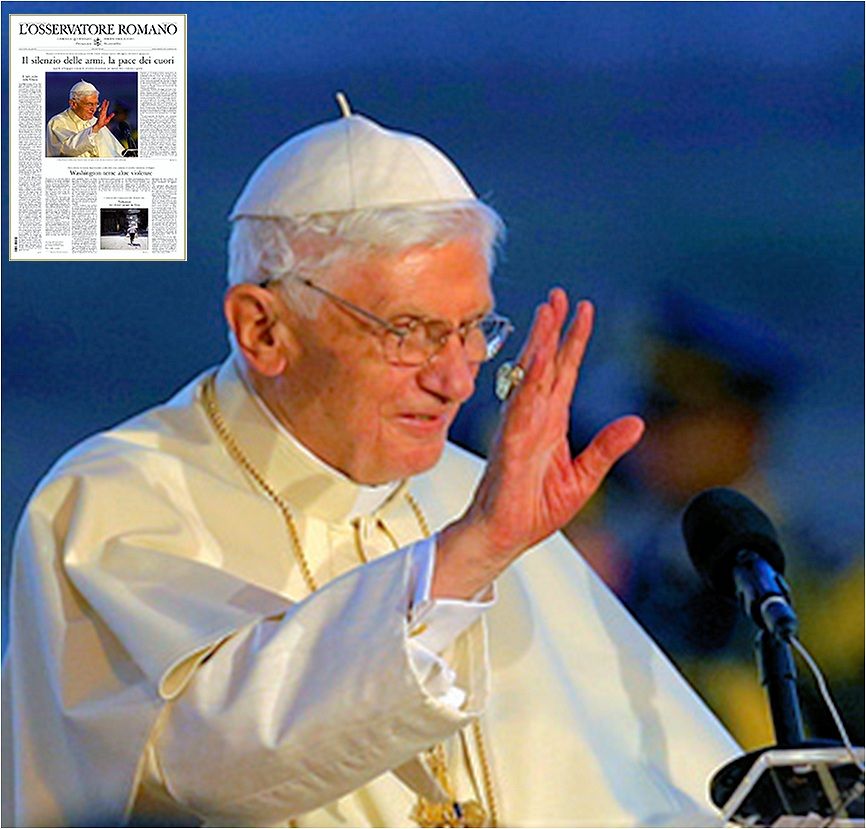 Benedict XVI delivering his farewell address at Beirut airport on Sunday, Sept. 16.
The true face of the Church
Benedict XVI delivering his farewell address at Beirut airport on Sunday, Sept. 16.
The true face of the Church
Editorial
by Giovanni Maria Vian
Translated from the 9/17-9/18 issue of

Certainly, it was a journey of peace that Benedict XVI undertook to Lebanon. And the media in general observed that this was so. With positive comments that underscored the courage of the Pope.
But his visit to the region where Christianity was born and where it developed in its first centuries had a deeper sense that in some way summarized all the trips this Pope has made to show the true face of the Church.
His days in Lebanon will remain in the annals of the Pontificate for more than one reason. First of all, for the attention that the Holy See always, and now Benedict XVI, has given to the Middle East.
Suffice it to say that Benedict XVI has been to the region four times in the past six years, visiting Turkey, Jordan, Israel, the Palestinian territories, Cyrpus, and now Lebanon. In order to support the Christians of the Middle East and to affirm the need for coexistence among religions.
The Pope's visit took on a particular significance in the Land of the Cedars, as President Michel Sleiman well understood, who decided to be present, way beyond what was expected of him, at all the public events of the visit.
Received with a warmth that was spontaneous, Benedict XVI was seen in person by so many Lebanese, if only for a fleeting moment, after patiently waiting along the streets of Beirut, where on the last day, they greeted him with olive branches. [And those who weren't there would surely have watched him on TV. Beirut residents also saw his smiling face for days on their streets and buildings ]
And the Pope returned their attention, sympathy and affection with his support for Lebanon, very important to this small modern nation with ancient Biblical roots, which has always been accustomed to many peoples living together in peace, in a history that has at times been tragic, but during its happier moments, has constituted an example for the whole region.
That is, in fact, how the Pope described Lebanon in his farewell speech at the Beirut airport, evoking the wood from the cedars of Lebanon that was destined for the most sacred place in God's Temple in Jerusalem.
Thus, Benedict XVI's wish is that even now, Lebanon should continue to be a space for harmony that bears witness to the existence of God and of communion among men, "whatever may be," he said, "their political, communitarian and religious sensibilities".
An exemplary mission in a region that has been battered for too long by violence and wars, the latest being the tragic conflict in Syria, which is never far from the thoughts and words of Benedict XVI
The Pope has left behind many things from his visit, and not only in Lebanon. Starting with the work-demanding document Ecclesia in Medio Oriente, born out of the special Synodal Assembly that the bishops of the world dedicated in 2010 to the problems of the Middle East.
A text, translated to Arabic along with the Vatican's other official languages, and personally handed by Benedict XVI not just to the representatives of the various Catholic communities in the Middle East, but also to the leaders of other Christian confessions and of Islam, Indeed, the heads of the four major Islamic sects in Lebanon listened to him with great respect and attention during their private meeting with him. [When they told him that it is in the interest of the Muslims themselves that the Christians of the Middle East remain in the lands of their birth and continue their contributions to their national societies.]
But from the brief visit to Lebanon one fact remains above all: A great many saw in this kindly man of God who has become transparent with age - anjd who undertook, with impressive courage, a trip he wished to make at all costs - the true face of the Church.
A face that Benedict XVI shows to everyone, explaining it somewhat in an impromptu comment to the Catholic patriarchs after their encounter with the youth representatives in Bkerke.
He said that the Christian identity can best be summed up in the open heart of Jesus.
Indeed, the Successor of Peter is not just Christ's Vicar on earth, but also the primary witness to Christ by his example.
[Modificato da TERESA BENEDETTA 18/09/2012 15:40] |
| |
 18/09/2012 14:19 18/09/2012 14:19 |
|
| | | OFFLINE | Post: 837
Post: 2 | Registrato il: 16/09/2005
Registrato il: 02/04/2010 | Utente Comunità | Utente Junior | |
|
L'analyse de Jean Mercier Chère Teresa,
Je suis sûre que tu vas apprécier cet article: http://www.lavie.fr.
![[SM=g8431]](https://im0.freeforumzone.it/up/0/31/3760226.gif)
Béatrice
 Dear Beatrice...
Dear Beatrice...
Thanks for the much-appreciated tip. As you can see below, I lost no time translating it....
VIVE BENOIT XVI!
Teresa[Modificato da TERESA BENEDETTA 18/09/2012 17:59] |
| |
 18/09/2012 17:56 18/09/2012 17:56 |
|
| | | OFFLINE | | Post: 25.512
Post: 8.007 | Registrato il: 28/08/2005
Registrato il: 20/01/2009 | Administratore | Utente Master | |
|
 Benedict XVI, the man who never backs off
Benedict XVI, the man who never backs off
In Lebanon, the presence alone of the Pope had a powerful psychological impact.
Reflections on the Pope's physical, intellectual and spiritual courage.
Translated from

September 18, 2012
The day after Benedict XVI's apostolic visit to Lebanon, which I covered for La Vie, the phrase kept coming back like a leitmotiv to those whom I asked for their assessment - from the diplomat in the ecclesiastical hierarchy to the mother who came to the Papal Mass in Beirut held under a leaden sun: "He came, he was not afraid, he did not shy away".
Up to the very eve of the trip, fears had persisted about whether it was feasible at all. Benedict XVI's determination to make the trip was known, but the crucial question was that of security. With the civil war in Syria, and its repercussions on adjoining Lebanon, some did not believe he would make the trip at all until they saw him going down the airplane steps in Beirut.
The psychological reverberation of his trip is immense, in the current context of great tension in the region. The fact that the Pope had come in flesh and blood is a source of hope that is difficult to imagine in France.
In Lebanon, it was a national event, a true feast in this country, where men habitually live holding their breath for fear of the resurgence of any inter-community conflicts.
But the psychological relief also extended even to those who are in Lebanon for other reasons. I think of Editha, a Filipina Catholic who was at the Mass.
"I am a domestic servant for a Lebanese family. I am here to earn a living for my family. I have not seen my children for six years. May last child was only a year old when I had to leave. Coming to this Mass by the Pope is like balm for my heart".
Joseph Ratzinger has never been a man to back off. At the end of the 1950s, when his dissertation [to earn his Habilitation as a professor qualified to teach in German universities] was drastically cut down by a hostile professor and his professional career seemed in peril, he went around the obstacle by re-fashioning his work from a different angle that would render it impregnable to his adviser's challenge.
Since 1982, as Prefect of the Congregation for the Doctrine of the Faith, he became, for the media, a negative symbol of the institutional Church. Others may have cracked under the constant burden this meant,but not he, who went on humbly carrying out his tasks without worrying about his image.
Since 2000, Joseph Ratzinger knew that his public image as one who sought to 're-frame' rebel theologians into orthodoxy was behind him, when his desk began to pile up with files about priests accused of committing sex offenses against minors and children.
Though it was also a time of omerta [silence imposed, Mafia-like, on criminal matters] - since those around John Paul II did not wish to expose figures like Marcial Maciel, founder of the Legionaries of Christ - the cardinal prefect knew the Church was dealing with a ticking time-bomb.
He availed of a window of opportunity, as John Paul II drew closer to his final days, to sound the alarm in public about the 'filth' in the Church, particularly among some priests, denouncing this in the meditations he prepared for the Good Friday Way of the Cross in March 2005. Never before had a curial cardinal broken the taboo to point out what seemed to be a blind spot for the Church.
Nor did he back off when his peers elected him Pope at age 78. The global message of the cardinals to him was clear: "Joseph, you are apparently the only one who knows the extent of the damage. Please clean it up for all of us". The cardinals were not foolish - and Joseph applied himself to the task.
And so, he has not backed off either from the problems of the Middle East. To launch a Synodal Assembly on the Middle East was frankly not an easy task, considering the complexity of the Eastern Catholic Churches themselves which are divided, and the overall context of the region itself.
The Middle East was never really the theologian Ratzinger's domain. [But his lifelong appreciation for what Christianity owes Judaism and the unique bond that will always link the two religions has always set him apart, and has been a thread running through his ecclesiological and theological thinking]]
But what matters is that the Pope launched the dynamic of the 2010 Synodal assembly, which saw its culmination in Beirut this weekend.
His courage was physical, to begin with. His program, crammed into about 48 hours, was quite packed. During his public events, Benedict XVI had to endure the infernal heat of late summer in Beirut while under the permanent glare of TV lights.
He devoted individual attention to hundreds of prelates and laymen who lined up to greet him at each event. He was focused on what the leaders of Lebanon (secular as well as ecclesial) had to tell him at their private meetings during which every word he said could have unforeseen consequences.
At age 85, it was quite a feat. He has become visibly more frail, and now moves about more often with a cane to keep his balance, but those who had the opportunity to see him up close say that his memory and his sense of humor remain sparkling as ever.
In Lebanon, the Pope made public the text of his Post-Synodal Apostolic Exhortation, Ecclesia in Medio Oriente, which he himself described as a road map for the future of Christians in the Middle East.
But in it, he does not hesitate to go against the grain and reproach the Christians of the region for certain faults. For instance, the text devotes a considerable part to tracing the Jewish origins of Christianity.
As we know, in the Middle East, the Israeli-Palestinian conflict is on everyone's mind all the time. To recall he importance of Judaism to the Christian faith was thus an act of courage in itself. It is proof that Rome, through the Pope, brings another point of view, and is willing to re-open some wounds in order to better heal them. One can doubtless see in this the essence of the Petrine ministry.
The other 'anti-demagogic' element of the Exhortation is Benedict XVI's position about secularism. In the Middle East, secularism is largely seen as a foil, an ailment of French origin which has contaminated the West and led it to break off its attachments to God (and which explains why the Western powers have no interest at all in the fate of the Middle Eastern Christians).
But Benedict XVI advocates the virtues of 'healthy secularity': "(It) means liberating faith from the weight of political considerations and enriching politics with the contributions of faith, while maintaining the necessary distance, clear distinction and indispensable collaboration between both... Such a secularity guarantees that politics can function without instrumentalizing religion, and gives religion the ability to live freely without being weighed down by politics dictated by special interests and sometimes hardly in conformity with - or even, directly opposed to - belief".-
This is a recommendation which, in the Middle East, strikes at the manifold confusions between religion and politics.
In Beirut, the Pope used unsettling words to appeal for peace, evoking the urgency for forgiveness and for the conversion of hearts in front of an audience of political and religious leaders:
We need to be very conscious that evil is not some nameless, impersonal and deterministic force at work in the world. Evil, the devil, works in and through human freedom, through the use of our freedom. It seeks an ally in man. Evil needs man in order to act... But it is possible for us not to be overcome by evil but to overcome evil with good. It is to this conversion of heart that we are called... True, it is quite demanding: it involves rejecting revenge, acknowledging one’s faults, accepting apologies without demanding them, and, not least, forgiveness. Only forgiveness, given and received, can lay lasting foundations for reconciliation and universal peace.
Words that could well glide away like water on oilcloth in our postwar European societies where, in a long time, we have not known civil war, nor families decimated by bomb attacks, nor the fear of being abducted and disappearing without a trace (which continues to be very real in the Middle East today).
And in Lebanon? "Forgiveness is not that obvious for Lebanese or Syrians," commented Jesuit priest Samir Khalil Samir to me the day after the Pope left Beirut. "To accept that the murderer of someone in your family is a brother one ought to love and forgive is very difficult".
Forgiveness of offenses committed against you and your loved ones and the conversion of individual hearts constitute a truly great challenge [The Pope underscored, in the same address, "True, it is quite demanding..." but following Christ was never supposed to be an easy task], especially in the Mediterranean culture which is marked by subjection to one's religious or familial clan, by the logic of vendetta, and by so-called 'codes of honor'. The Lebanese, in particular, are imprisoned by a fundamental fear which is principally for their physical survival.
This 'particularly demanding conversion' is asked not only of those int he Middle East. It has resounded in everything this Pope ha ssaid over the past seven years. It will be at the heart of the coming Year of Faith which begins in a few weeks.
A prophet in Lebanon through his words and by his physical presence, Benedict XVI is more and more the Pope of interior freedom.
[Modificato da TERESA BENEDETTA 18/09/2012 18:53] |
| |
 18/09/2012 18:23 18/09/2012 18:23 |
|
| | | OFFLINE | Post: 838
Post: 3 | Registrato il: 16/09/2005
Registrato il: 02/04/2010 | Utente Comunità | Utente Junior | |
|
![[SM=j7798]](https://im0.freeforumzone.it/up/0/98/2971038.jpg)
Super!
Thank you very much!
Béatrice |
| |
 18/09/2012 18:48 18/09/2012 18:48 |
|
| | | OFFLINE | | Post: 25.513
Post: 8.008 | Registrato il: 28/08/2005
Registrato il: 20/01/2009 | Administratore | Utente Master | |
|
 Tuesday, Sept. 18, 24th Week in Ordinary Time
Tuesday, Sept. 18, 24th Week in Ordinary Time
 Center photo: The saint's tomb in Osimo.
ST. GIUSEPPE DA COPERTINO (Joseph of Cupertino)(Italy, 1603-1663), Franciscan Mystic, Confessor
Center photo: The saint's tomb in Osimo.
ST. GIUSEPPE DA COPERTINO (Joseph of Cupertino)(Italy, 1603-1663), Franciscan Mystic, Confessor
Born in Italy's southeastern region of Apulia (Puglia), Giuseppe was ill-tempered and dull-witted as a boy. After being rebuffed many times for lack of education, he was finally admitted to the Capuchin order, where he became known both for his learning disability and for his ecstasies in which we wandered about in a daze. He was assigned menial tasks in the kitchen and with the animals. It was said that since he could learn only one thing at a time, he lucked out and became a deacon when the question he was asked happened to be the one question he had studied. And that later, he lucked out again when the other candidates for priesthood in his 'class' did so well at exams that everyone else was passed. Two years after he was ordained a priest, during a procession for St. Francis, he astounded everyone with his first 'flight' - his ecstasy sent him soaring into the air where he hovered for some time over the procession. In his lifetime, more than 70 such flights would be documented, usually touched off by the simple mention of the name of Jesus or Mary. The most famous of these flights took place at the Vatican when he was overcome by being in the presence of the Vicar of Christ (Urban VIII at the time). His 'flights', along with healing powers, brought him such fame that people tore off pieces from his habit as relics, and eventually, the Vatican had to order him exiled and 'concealed' in various places, including the Sacro Convento in Assisi, where he remained for nine years. He continued to be sought out by prominent people. His final exile was to Osimo near Ancona, where he was prohibited from talking to anyone but his Bishop and superior, and if necessary, a doctor. He fell ill in August 1963, and had another ecstatic flight during the last Mass he celebrated, on the Feast of the Assumption. He died shortly thereafter. He was buried in the Church of St. Francis in Osimo, where a marble altar was erected to hold the g;ass urn containing his remains. He was canonized in 1767. He is the patron saint of pilots, astronauts, paratroopers and also of students.
Readings for today's Mass:
www.usccb.org/bible/readings/091812.cfm
AT THE VATICAN TODAY
- No events announced for the Holy Father.
- The Press Office released the list of bishops named by Pope Benedict XVI to take part as Synodal Fathers in
the General Synodal Assembly on the New Evangelization to be held at the Vatican from Oct. 7-28.
- The following communique was also released:
The Holy See will participate once again this year in the celebration of the 'European Days of Patrimony', an annual observance promoted by the Council of Europe in which 50 states of the European continent take part.
This year's observance, on Sept. 30 is on the theme "Images of faith in the European patrimony". The Pontifical Commission for the Cultural Assets of the Church and the Vatican Museums contributed to preparing the program of events. On that day, entrance will be free to the Vatican Museums.
One year ago today...
The Vatican released the text of the Holy Father's video-message to the German people on the eve
of his apostolic and state visit. The video was played on German TV the previous night.
www.ardmediathek.de/ard/servlet/content/3517136?documentId...
I see Photobucket is 'acting up' again this morning today - I must say these episodes are getting more frequent. The first 24 hours of the Pope's visit to Lebanon,
I couldn't upload on it and was forced to use the far less wieldy Image Shack, which does not provide the image links as cleanly and directly as Photobucket does
and therefore takes up more time to use.
[Modificato da TERESA BENEDETTA 18/09/2012 19:00] |
| |
|
|
|
|